#very ATOTS of the show
Text
Okay, I’ll try to be quick about this. I’ll do it in list form to set some ground rules and get my analysis going.
(I am arguably very frustrated overall about what I’m about to write, because of how excellent The Eighth Sense was, and watching this was just a bit of a downer, man.)
1) I will own that at this point, I might be the only The Promise apologist on this site. I might have led friends astray at this show. For that, I offer a 90-degree wai of apology. I gotta check the tag, but I wouldn’t be surprised.
(Senpai @respectthepetty...I’ll watch The Shipper as self-punishment.)
2) Yes, Phu DEFINITELY sucks. BUT, there’s a but that I’ll get to in a sec.
3) For the first time in this show, I am actually frustrated by the pace.
4) Party definitely rules, Mr. Sassy.
Alright, all that out of the way, get ready to hear why, once more, even I surprise myself by saying, I STILL like this show, but we’re on shakier ground. The Promise, episode 7, here we go:
We’ve now established two social rules by which Nan and Phu operate:
a) Phu is afraid of loss, 100%. He’s scarred by his father’s death, and doesn’t want to lose anymore people in his life, especially his best friend.
(HOW that equated to him RUNNING AWAY for 10 YEARS is STILL unclear to me, but I SUPPOSE that if Nan can STILL wait for an answer, then WE, as the audience, are expected to wait, TOO, which I THINK, dear director Khom Kongkiat/Uncle Tong, is ASKING a little MUCH of US, BUT ANYWAY)
b) Nan has said this shit in the past and present about how he wants FRIENDS, and separates that from LOVERS. And Phu is all up in his confusion about that.
I mean, I think I can get that those are legitimate reasons why Phu continues to hold back from revealing his truth to Nan.
But, fuckin’ GO PARTY. Party is like.... what the fuck, dude? Just come out and say it!
AND: Party put himself out there! He put himself out on the line! He revealed himself to Nan! Nan rejected him. But guess what? They’re still gonna be friends! PHU SAW ALL THAT!
Will Phu NOT be satisfied IF Nan rejects him? I mean, Phu will be sad, but... can’t they be like Party and Nan, and still be friends? NO?
On the one hand, I say: WHAT THE FUCK? Phu -- you are REALLY hyping this up! Why should everything be 100% with you?
On the other hand, I say: My socio-emotional read is that because Phu experienced the death of a loved one at an early age, things might HAVE to be 100% with him.
I just don’t know if Uncle Tong is weaving this complicated and emotional story as well as he could be at this point. I don’t know how efficient each episode is at selling the skincare. I absolutely loved the focus on the coffee farm and the process of the beans and everything. I love, love those slices of village life. It very much harkens to P’Khom’s actual role in Bad Buddy, and obviously goes to show how much he wants to profile these slices of Thai village life. I love those parts.
But at this point, as I said last week, we’ve waited too long. We need clarity. I get we have three episodes at an hour each, but the pace has now started to drag. I love what this show gives by way of a respect of the rural life these guys come from, but the imbalance is there among Devonte commercials/life in Chiang Mai/Granny and how she’s there to explain who Phu really is/Nan’s patience.
It’s not quite working anymore. I’m gonna stick out this show, because who knows if Uncle Tong can give us a huge and surprise ending, and there are only three episodes left, anyway.
But seriously, Nan is getting fuckin’ seriously played, and like, I think Phu is not as dumb as he’s being written. Maybe Phu’s read is that he thinks Nan is a lot stronger than Nan actually is. I don’t know. I just don’t know why Phu would play his homey like this for SO LONG. WHY DID PHU COME BACK, ONLY TO ATTEMPT TO RUN AWAY AGAIN.
Yes, you’re held back by your demons, but -- maybe it would have been best if Phu had just permanently stayed away.
Come on, Uncle Tong. PLEASE clean up this mess. I HAVE HOPE.
#the promise#the promise meta#nan x phu#phu x nan#i think i'm sticking with this show in part because the leads have EXCELLENT chemistry#i like both of them as actors very much#and i really love the chiang mai parts#very ATOTS of the show#but seriously#phu doesn't not realize what a fuckboi he is#it's ENOUGH#ENOUGH ALREADY#GIVE US SOME TRUTH UNCLE TONG#you were all about truth in BBS#just#COME ON ALREADY
11 notes
·
View notes
Text
I'm going to have coherent thoughts about the OS2 x BBS x ATOTS EP at some point, but for now all I can say is
NICE TOUCH WITH THE CALVIN KLEIN UNDIES ON PAT, WARDROBE DEPARTMENT
#os2xbbsxatots#our skyy 2#bad buddy#our skyy 2 x bad buddy#our skyy 2 x bad buddy x atots#thank you wardrobe department#idk if this still a thing but when i was growing up ck undies were THE brand to wear if queer and dude shaped#they did very nice photoshoots back in the day#probably showing my age here but idgaf#my nonsense
24 notes
·
View notes
Text
omg hiiiii!!!! <3

#started atots after the moonlight chicken trailer#its a very calming show#the flute ost reminds me of folk bengali songs so much#a tale of thousand stars#pleasantly surprised by how good its going#zatxt.#khaotung thanawat
3 notes
·
View notes
Text
here’s an opinion that you can leave or take or call me puritanical over but I feel this strange sentiment come from the thai QL fandom here that equates explicit content as progress in queer representation.
am I even reading the vibe right? idek because that life view is so unreachable to me lol but if you ask me the most progressive queer representation to have been released in the last couple of years is this

I understand that different people have different markers of progress and you don’t have to ascribe to or even understand mine but you must acknowledge that it exists.
SOTUS and A Tale of a Thousand Stars are older BLs that have very few parallels to me BY modern standards because to me progress is being able to watch a queer show with my family.
I’ve had a lifetime of watching queer as folk, grainy old school Japanese BL, lipstick jungle, weird french movies about gays with mommy issues in the dark, in the middle of the night; alone.
A lakorn like To Sir, With Love is something I can watch in the light with my whole family. Queer retelling of quintessential asian love stories like ATOTs or Moonlight Chicken that I can show my mom and have her understand queer love in the narrative language that she understands - that’s progress. That is what I have spent my entire youth praying for.
Don’t get me wrong I love buttcracks and the threat of male pregnancy just as much as the next person but dear god do I also need offgun to make 57 more heartwarming shows where their lips touch for 3.1 seconds so I can share this part of my life with the people that matter to me.
#thai bl#thai ql#to sir with love is excellent by the way#consider this a rec#nani’s hot takes#there are times that I read takes on tumblr dot com and I just have to be like do you realize other people exist#😂😂😂#I understand 4 minutes is good but also cool it with the gmm hate#some of us need that shit to live
93 notes
·
View notes
Note
If you could, how would you have made Wendy be included in the secret basement scene at the end of Not What He Seems? She was the only main character left out and I always thought that was unfair.
OH GREAT QUESTION! so, when you look into behind the scenes stuff for really plot heavy episodes like not what he seems and atots, you kinda end up realizing that pacing is REALLY important and they need to use every second of those 22 (and 30 in ATOTS’ case) minutes as effectively as they possibly could. not what he seems is a very tight episode and i think it’s hard to fit in stuff in there, especially considering i think that wendy is the “weakest link” of the show character wise, but if i HAD to pick, i think id have wendy be in manly dan’s truck when he swerved into agent trigger’s car!
i mean think about it. dan is already in that episode, and wendy seeing her friends in a STRANGE GOVERNMENT VEHICLE that they literally got her dad to RAM to escape, uh, yeah i think she’s gonna make it her problem now! i think you could possibly shave off the kerpranked bit to put wendy in? or like other bits i don’t know. maybe just a moment or two where wendy’s like “what is going ON, is mr pines in trouble? are you in danger??” and then she can join the kids at the shack
it’s hard though. it’s definitely hard. because i think that wendy as she is now really couldn’t fit into the emotional core of the episode, which is, of course, the turmoil between the kids (as well as the viewers) and this secret about stan that’s rapidly spreading to them out of his control and they’re learning all the wrong stuff first and the tension between stan not even being stan and the kids trusting their uncle is like, JUICY-
but, like, wendy? we know she likes working at the shack, but that’s because she’s Cool and likes to slack off there. she slacks off and she’s like “meh” to stan a lot. i mean, she slacks off at the pool, too, when she gets that job. does she like stan because he lets her slack off? that can’t be right because stan doesn’t really let her, it just sorta happens. how did she even get the job from stan? did she ask? was he hiring? does she find him annoying because he’s always telling her to do her job? does she find it odd that stan would bring two kids up to his place for the summer? we don’t really know.
i can’t imagine her being stuck between these two extremes for stan because she never seems invested in stan. she must always be the aloof one, the cool one, never made to be vulnerable because being vulnerable is Not Cool. her only appearance in not what he seems being her going “nope i’m not going into work today that’s too much for me” is so telling in all the worst ways. and it can be frustrating
29 notes
·
View notes
Note
I work at a summer camp and have been rewatching Gravity Falls with my campers, which gives me the superpower of being The Guy Who Knows Everything About This Show, thanks in part to binging all your videos. I got like an hour into your ATOTS video while washing dishes and taking my lunch break, so when I got back to the kids and it was time to watch the episode with them I was vibrating with special interest. We had been trying to limit them to one episode per day, but I am incapable of just stopping after Not What He Seems, so they got special extra Gravity Falls time thanks to me being so very normal about the Stans.
I finished the video once I got off work, 100/10, four hours well spent, I need to chew drywall about these men.
cronch cronch cronch
(but also that is so sweet and so cute)
33 notes
·
View notes
Text
This Week in BL - 2 GREAT Shows but everything else is kinda blah
Organized, in each category, with ones I'm enjoying most at the top. Happy new year, BLabies!
Jan 2024 Wk 1
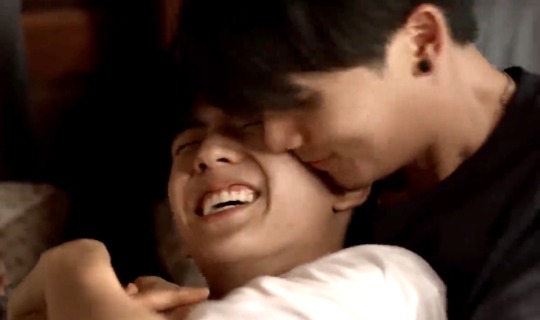
Ongoing Series - Thai
Last Twilight (Fri YT) ep 9 of 12 - This show is really earning its chops, and these actors are executing beautifully. I think this is a great BL, and it reminds me quite a bit of ATOTS, only the physical comfort between the actors is more genuine and easy to watch. Unfortunately a guitar came out. Nice communication tho.
That was a very lovely romantic sex scene. Very prettily done. Classy boys, very classy.
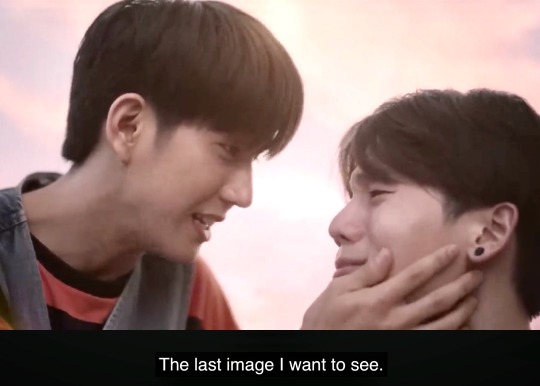
Gah what a beautiful final scene with Day saying the last thing he wants to see is Mhork. Pure unadulterated romance of the highest order.
The Sign (Sat YT) ep 7 of 12 - If killer, why hot? Poor Tarn compelled to try to rescue everyone else from their fate, because he cannot save himself from his.
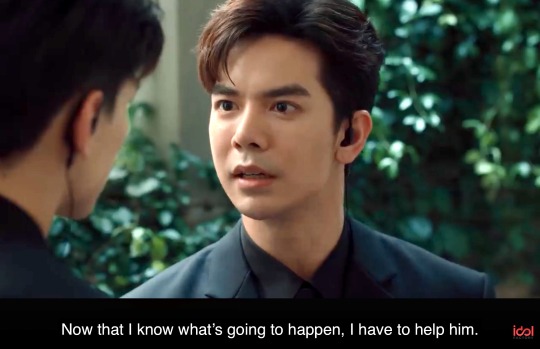
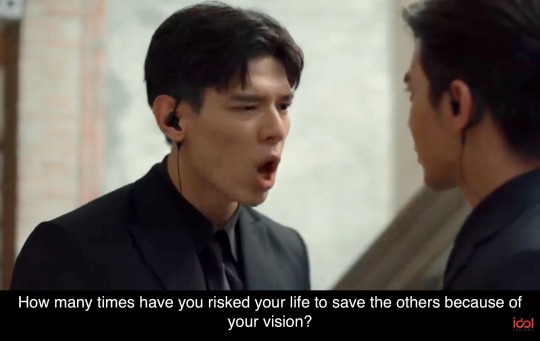
Meanwhile Phaya is finally learning that you catch more water snakes with honey lube than vinegar.
Stellar confession from Phaya brutally honest and very fated mates.
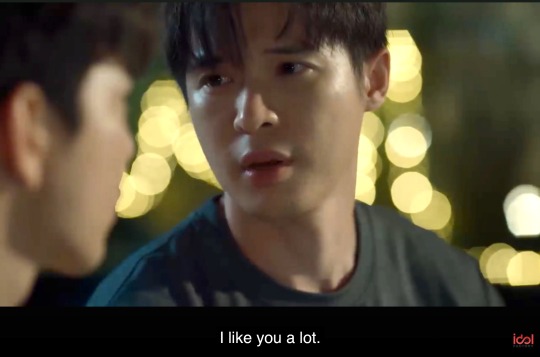
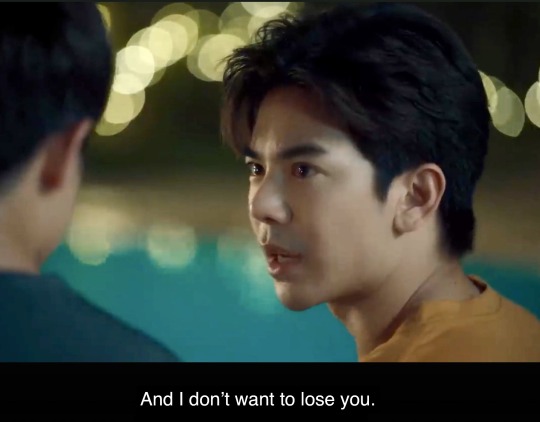
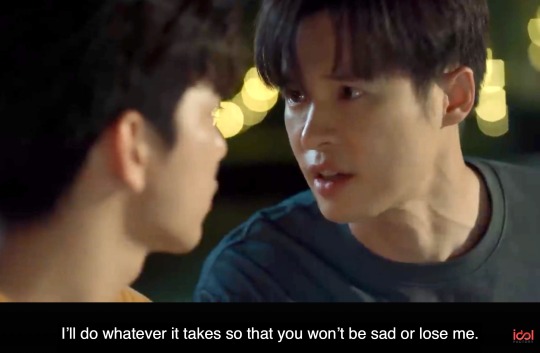
And another lovely sex scene, so I guess that was a vision and not a fantasy Tharn had.

Lets be clear those two shows were GREAT everything else this week was kinda blah.
For Him (Thurs iQIYI) ep 6 of 12 - I find the backstory very odd. Are they twins? What happened to Blue? Am I meant to care? Do I care?
Twins the series (Fri GaGa) ep 10 of 12 - I mostly just feel sorry for First. He’s so rightfully confused. Zee/Sprite keeps blowing hot and cold because they two different people! The after sex cuddle was cute.
Pit Babe (Fri iQIYI) ep 8 of 14 - Love getting more JeffAlan. Also I switch favorite character allegiances in the trash watch happening here.
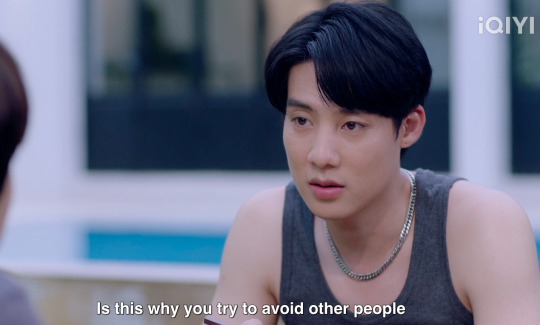
Cooking Crush (Sun YT) ep 6 of 12 - Didn’t air this week and I hardly noticed.
You and My Stars YT 1 of 2(?) - school kids, love triangle, it’s cute enough.
My Universe (Sun iQIYI) 1626 ep 20 of 24 - Just so boring. 3/10

Ongoing Series - Not Thai
VIP Only (Taiwan Fri Gaga) ep 8 of 10 - I’m not into the love triangle. Although I kind of like the new suitor, he’s honest and a good communicator. I appreciate these things in a BL boy. But I begin to wonder if triangles should be left for KBL. Also, this should have been an 8 epper, 10 is too long.
Sahara-sensei to Toki-kun (Japan Fri Gaga) ep 5 of 8 - No ep until Jan 12
I Became the Main Role of a BL (Japan Sun Gaga) ep 1-3 - AKA BL Drama no Shuen ni Narimashita: Crank Up Hen - A rising star is paired with an (older) former child actor (doesn’t think he’s good enough) in a BL series. It’s fun, built on a dynamic of off screen paralleling the on screen, so near constantly meta. All the tropes are there but are as a result of the filming process. The star turns out to be obsessed with the former actor and very dorky about it. In fact, everyone in this show is a little gremlin weirdo (affectionate). There’s tons of scenery chewing miscommunication drama, slapstick, voice over head hopping, and eccentric sides characters. “And he comes with feathers” applies to a number of my friends. You know I don’t like stories around fan obsession, but otherwise this was enjoyable. 8/10
A nice start to the JBL year. Keep em coming, Japan.
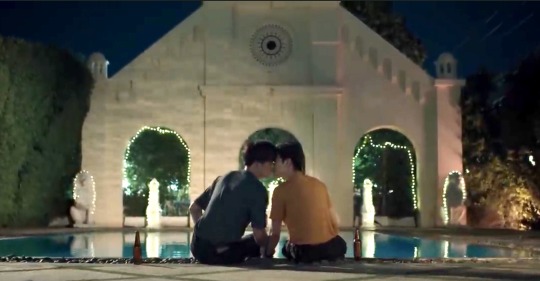
It's done I Need to Catch up
What Did You Eat Yesterday Season 2 AKA Kinou Nani Tabeta? Season 2 (Japan Gaga) 10 eps - will binge when I have a spare day.
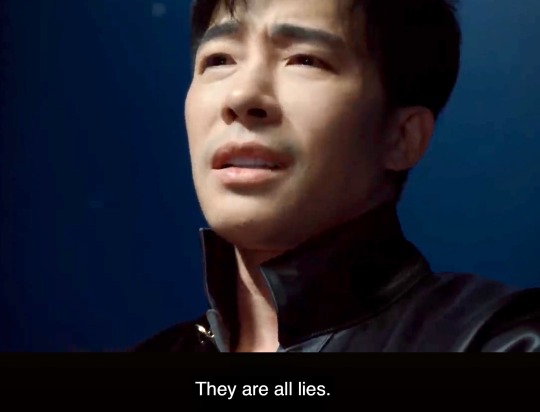
It's Airing But...
[INTERNATIONAL] Cherry Magic (Sat YouTube) ep 3 of 12 - yeah Japan put the smack down on our boys. Sadness. You can use a VPN if you like. Read all about it here.
Playboyy (Thurs Gaga) 14 eps - Dear Playboyy, it's not you, it’s me… I hate you. You’re about as deep (and as palatable) as a shot glass of cum. While I'm sure you’re someone’s kink, you're my weakest link. Goodbye. I DNFed this at ep 5. Frankly I'm impressed with myself for getting that far.
Night Dream (Sat YT) 6 eps - It’s a pain to track down and I really didn’t like the first episode so… DNF
The Whisperer (Sun ????) 10 eps - Thai horror BL that ALSO involves cheating (what joy is mine). I don't think even the perfect single dimple can motivate me to watch. Word is... it's terrible.
7 Days Before Valentine (Weds WeTV) 10 eps - Giving me Luminous Solution vibes. I'm waiting to binge if safe.
Dead Friend Forever (Thai Sat iQIYI) - horror, meh, tell me if it's worth my time?
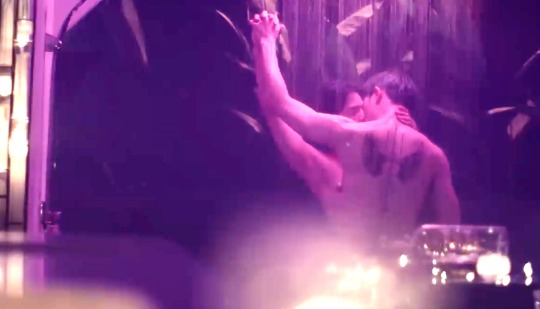
In Case You Missed it
All my year end round ups (so far) are as follows:
TOP 10 BL Trends of 2023
Top 10 BL Secondary Pairs of 2023
2023 BLs Best Trope Execution Awards! TOP 10
Best Back Hugs Thailand & Elsewhere
BL 2023 - Cute Bits of Domesticity
BL 2023 - Boys Feeding Boys
BL 2023 - BOOP!
All the BLs Announced for 2023 that didn't happen
Next Week Looks Like This
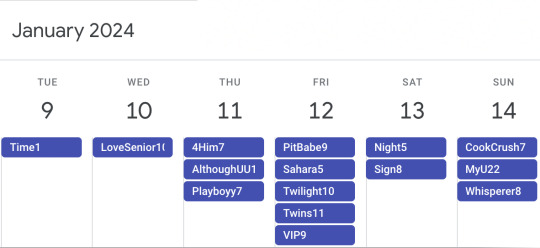
Starting This Week:
1/9 Time the series (Thai Gaga, WeTV, Channel 3) 10 eps - MFlow Entertainment brings us yet another "fix the past" narrative. After witnessing the gunning down of his beloved, a heartbroken actor uses a magic pocket watch to go back in time and discover the truth and maybe fix it.
1/11 Although I Love You and You AKA Sukiyanen Kedo Do Yaro ka (Japan Gaga) - Soga, who, after a divorce and relocation to Osaka, seeks solace in dining at 26-year-old Sakae's restaurant. Unbeknownst to Soga, Sakae sees him as more than just a regular customer.
More Coming Jan 2024
Beside You (Thai YouTube)
Love For Love's Sake (Korea ????)- based on the Manhwa ‘Love Supremacy Zone’ by Hwacha. A young man is dropped into a game based off a novel he loves. His mission is to make another player, YeoWoon happy. But then the game starts unfolding completely different from the novel.
Ossans Love Season 2 (Japan ????) - five years later, will anything have changed? This is Japan so... probubly not. I won't be watching this.
Upcoming BLs for 2024 are listed here. This list is not kept updated, so please leave a comment if you know something new or RP with additions.
THIS WEEK’S BEST MOMENTS
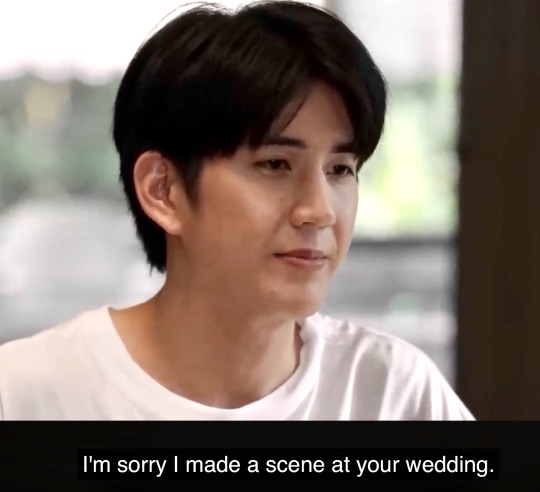
Yes, you SHOULD apologize!
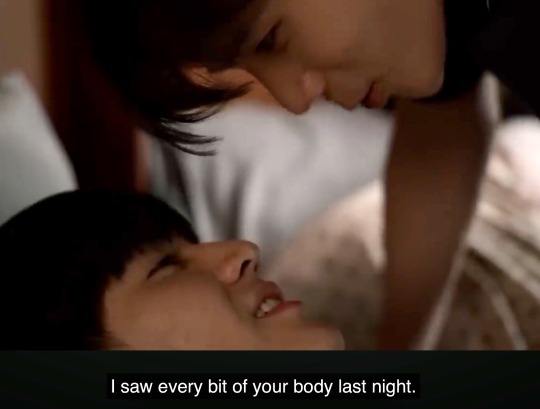
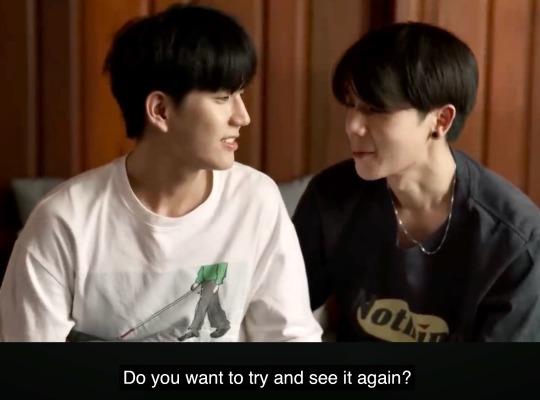
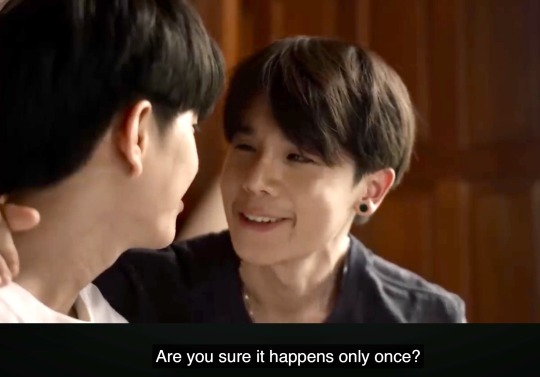
This was a FANTASTIC moment! Last Twilight
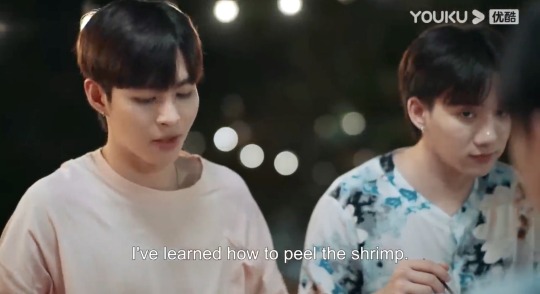
Night Dream referencing the Shrimp Trope.
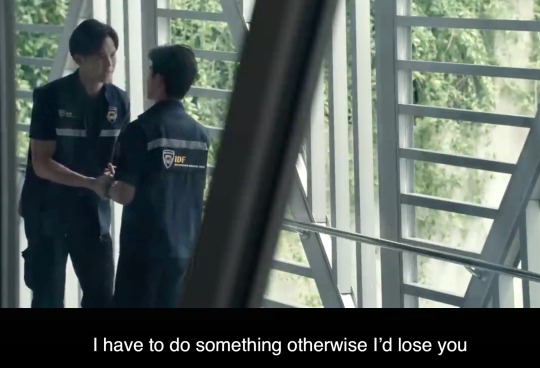
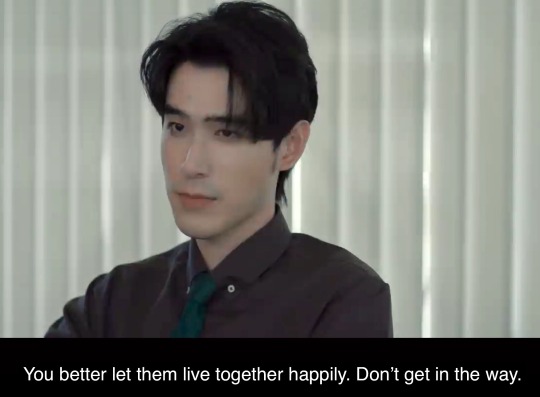
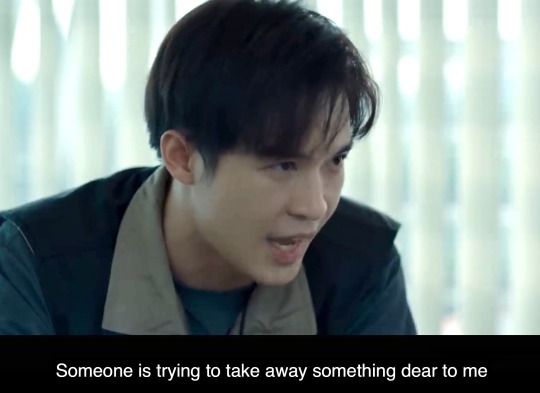
Some didn't like this bit BUT I love a claiming moment, even in a briefing room... especially there.
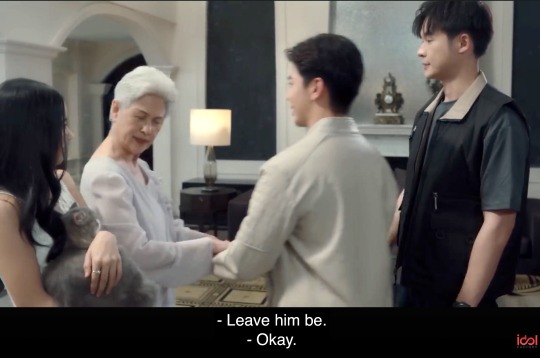
I ALSO love a good Grandma Moment in a BL.

Such a good sex scene. The Sign
(Last week)
#two great sex scenes this week!#both from thailand#thai bl#Last Twilight#The Sign#this week in bl#bl updates#the sign the series#for him the series#Twins the series#I Became the Main Role of a BL#Japanese BL#BL Drama no Shuen ni Narimashita: Crank Up Hen#BL series review#taiwanese bl#PitBabe#Night Dream
129 notes
·
View notes
Text
There are a lot of things I'm thinking after watching the Alex Hirsch interview but a lot of it really is how much I appreciate how much I have learned about storytelling and emotion and how much of that was through GF. I'm sure most of the people who were around back in the day aren't here anymore, but there was a theory called Grunk4Gramp that arose in the hiatus after NWHS and before ATOTS. It was essentially that, since we knew Stan had stolen Ford, (god, he was still Stanley at the time)'s identity, that Grunkle Stan was the twins' grandfather. And I don't remember my exact opinion at the time but then when the "Shermie's grandkids" line and the fandom exploded again. I don't remember exactly when I realized that, yeah, that is a bit of a sloppy solution, but emotionally, yeah. It can't be Stan or Ford because that would retroactively make one or both of them really, really bad. It would be heavy and super complicated to cover in half a season. And then hearing Alex literally say that, practically word for word, just makes me really happy.
It makes me think more about just the prevailing attitude of "oh they're geniuses they must have had a plan for everything!" level of deep scrutiny. Which like, honestly? Fair. Most of us were in high school or younger. GF was a show like no other. It encouraged this kind of behavior. In retrospect, the moment that started falling apart for me was when a lot of people were so deeply insistent on the slit pupil maybe-still-possessed-Bipper thing after NWHS that I just... It's like Grunk4Gramp. What kind of storytelling would it be if Dipper wasn't making any of his own decisions? What would we even gain from the story then?
Being a creator is very difficult. Even as creators, we often forget that people who make things are still human and make mistakes. We sometimes forget that things can't be perfect and shiny and are just going to be good enough. We fight for those emotional beats and sometimes it'll make something inconsistent. Or sometimes something will fall a little flat. Or sometimes something will fall really flat. And that it happens to everyone, even creators we really love and respect. The best we can do as people is fight for the story we want to tell, not filling every plot hole and demanding an answer for every little thing. It's fun to be the second -- god, don't I know it. It is SO MUCH FUN overanalyzing things, ask literally any of my friends -- but knowing that something being complicated and intricate doesn't mean its good and vice versa.
Anyway I just really respect the GF crew and how much they put into this show, even now, 12 fucking years later. I really respect and love the fandom and all the wild shit that came out of it. My main creative project right now wouldn't exist if it wasn't for an offshoot fandom of the GF fandom, which is really a weird thing to say out of context. I just miss it.
oh also I found this on my blog while trying to find grunk4gramp things and lmao

8 years ago...
#mary blabs#do i put this in the tag#eh why not#gravity falls#miss ya dreadfully glad we never got more#altho the way alex talked about the stan ford dynamic god i want that spin off he will keep in his back pocket#i am stoked for book of bill#i am an unrepentant bill fan hes the worst i adore him
25 notes
·
View notes
Text
I wanted to write a quick reflection on Aof's work now that Last Twilight is over. I want to note that I haven't watched all of his shows, so this is just my personal impression based on the ones that I have watched.
What I've really liked about Aof's work is that I have seen him grow as a director over the years. I think he's fumbled here and there, sometimes a little more, sometimes a little less, but generally, each new work has been, in some way, a step forward in his journey as a director. I have some mixed feelings with HCTM and ATOTS, for example, but I really liked BBS and MLC. I have seen him hone his craft and mature as a storyteller--some of this was even evident in the early episodes of Last Twilight. Like I've said before, the romantic beats of his stories work really well for me, and the first three quarters of Last Twilight were no exception.
The last episodes of Last Twilight have made me question this development. Aof's endings have been controversial before, but this is a whole new level of... something.
A few missteps here and there are only natural. If you're a creator who regularly puts out new content, you are, at some point, bound to create something that is not very good or, at the very least, not as good as your previous work. The ending of Last Twilight, however, is so bad that I'm questioning many things I've learned of him as a director. They made some truly baffling decisions, and the execution wasn't good either. Is this really the story they wanted to tell? Do they truly think they were telling a good story? Or does it all boil down to the fact that GMMTV wants/needs to create the perfect happy ending for their branded pairs so that they can keep the fans happy and the pair profitable? I am gobsmacked and disheartened, though I can't say I'm surprised if it's the last one. Ultimately, it's all about money.
I don't know what the future holds re: Aof's career as a director. I know he's taking a break from directing, but if/when he comes back... it'll be VERY interesting to see where he goes from here.
28 notes
·
View notes
Text
thinking of pat and pran and genre awareness
I've been thinking a lot about this as the Bad Buddy x A Tale of a Thousand Stars Our Skyy 2 episodes air. Like @lurkingshan notes here, Pran is self-aware enough to notice the parallels between his situation and Tian's, and I've seen a lot of people wondering how Pran's self-recognition through Tian (and perhaps Phupha's self-recognition through Pat) will contribute to the emotional and narrative conclusions of these episodes. Furthermore, Pran and Pat keep talking about trope moments - either their own from their series (e.g., Oishi green tea) or Tian and Phupha's which they know about from Tian's posts online. Pat and Pran take it upon themselves to replicate trope moments from ATOTS (like the looming mosquito net hanging) for themselves, and to discuss how to leverage classic romance tropes to get Phupha and Tian back together (e.g., getting them drunk and singing karaoke together). Self-awareness, and the related genre-awareness, are the Bad Buddy brand - we've seen how well Pat and Pran know how to weaponize BL tropes to get what they want.
Bad Buddy itself is a show that was created by genre-aware people to be genre-aware. @miscellar writes here about how Bad Buddy's directors and actors set out to make a BL while being fully aware of the pitfalls of BL. Bad Buddy includes soooo many tropes and other genre conventions (being set at university, the sound editing, etc.) which place it firmly within the genre of BL. However, the show deliberately subverts BL conventions in order to make broader points about the genre itself - I go into (a lot) more detail here. As miscellar says in this post: Bad Buddy labels itself a romcom to subvert romcoms.
Bad Buddy also demonstrates its genre- and self-awareness through its repetition of tropes and callbacks. We see that especially now as the Bad Buddy Our Skyy 2 episodes are airing (@grapejuicegay outlines many of the parallels between the original series and the Our Skyy episodes here). The show remembers what it did and repeats them, intentionally, to draw new connections and make new arguments.
So the directors, show runners, and actors of Bad Buddy are genre (and self) aware... what about the characters?
In this post miscellar makes an interesting point - to the BL viewer, the first three episodes of Bad Buddy seemed like a pretty typical university BL, and it seemed clear that Pat, the deliverer of most of the tropes, would be revealed to be in love with Pran. But that's not what happens.
I talked about this here, but to recap: in the lead-up to his episode 5 revelation, Pat often fulfills the active or seme role in tropes (grabbing Pran, looming over him, saying flirty things, etc.). However, Pat is not genre-aware in the first few episodes of Bad Buddy: he does not know he is in a BL, so he isn't analyzing these interactions through the "code" of a BL, therefore he doesn't recognize these moments as significant. To a BL-literate audience, Pat seems the perfect "seme", but he doesn't even know he's in a story with a "seme" yet.
On the other hand, Pran has been in love with Pat for ages, and he is fully aware of how their story reads. He does not take the active/seme role in tropes very often in the first few episodes (and when he does, it's an accident, like their wrestling match) because he is trying not to be in the romantic narrative, he's trying not to pursue Pat. Pran is genre-aware, he recognizes all of their looming and suggestive commentary as BL tropes, but he knows that BL stories typically end happily. He knows they are in a queer love story (he's in love, after all), but he doesn't see any way this can be a happy queer love story, not with their families.
This is why Pran's "You can't keep doing this to me Pat" line on the roof at the end of episode 5 hits so hard - Pat has been acting like the lead in a BL series to genre-aware folks like Pran and us, the audience, but he doesn't even realize what he's doing. And to Pran, who is painfully aware of what type of story they seem to be in, but he doesn't think they can ever truly fulfill, this is devastating. Pran is trapped, with narrative awareness, in a story that can never come true, with someone who doesn't realize how they are playing along, hurtling the story towards its inevitable crash.
In episode 5, Pat comes to the realization that he is in love with Pran, and that Pran is/has been in love with him. In this post, @functionalasfuck writes how back in high school when Pat first heard Pran's song, he recognized it as their story but didn't see where Pran was taking it (even when Pran mentions secret crushes). Only on second thought does Pat realize what Pran meant by that and what the song was conveying. Pat and Pran's story slams into context (and genre) for Pat: this is a classic enemies-to-lovers, childhood-friends-to-lovers, long-term pining story; this is a BL.
And after Pat's episode 5 realization, things change. Pat acts again like a typical seme trope-wise through episode 6, as he follows Pran on the architecture retreat. He's trying to get Pran to talk to him, to join him in the BL he now realizes they are in. But Pran doesn't want to go down a road that he believes will end in heartache - he's known, from the beginning, that their story can be read as a perfect BL, but he's also known it can never end happily, not with their families - and so he avoids it, and Pat, at every turn.
It's finally at the end of episode 6, with the bet, that things change again. Both Pat and Pran realize they are in a romantic narrative. Pran has learned Pat isn't interested in Ink, so there is one barrier towards their genre-typical happy ending eliminated. Their families are still a concern, but Pran's in love and who can resist a bet, so they go forward.
The trope usage becomes deliberate - and it's always been deliberate on the part of the directors and show runners, they've always known what they have set out to do (make a BL that hits all the BL conventions yet subverts them) and have deployed tropes intentionally to uphold the messages and themes they want to explore (more here) - but now it is deliberate on the part of the characters too. Through the first part of the series, genre-aware Pran was trying to avoid acting the seme, trying to halt the progression of the romantic narrative he believed could only end in tragedy, and genre-unaware Pat was throwing himself into trope instances headfirst without realizing. Now, they have made a pact to both be the active pursuers, the seme: whoever falls in love first loses. They both deploy BL tropes with razor sharp precision (Pran looms, Pat takes off his shirt and douses himself with water, etc.) showing that they do understand what these actions mean, how they fit into and read in a BL-coded context. The most obvious example of this in episode 7 is when Pat and Ink and Pran and Wai eat at the noodle stand together. Pat and Pran leverage their respective "faen fatales" (more on that here) to make the other jealous by deploying a litany of BL tropes (feeding the other, wiping their mouth, etc.). Pat and Pran show they know what these actions mean in the context of a BL story, like their own.
Pat and Pran are in on it now - they are self-aware enough to recognize their genre, they know the beats of that genre, and they know how to manipulate them to get the outcomes they want.*
And it soon becomes apparent to us that Pat and Pran are in on more than just the genre of their show - they are onto the fact that there is an audience. @miscellar writes here about how Pat and Pran break the fourth wall several times throughout the course of Bad Buddy (e.g., Pran's comment about not needing to be called wife, or the voiceover in episode 12, which @chickenstrangers also talks about here, where Pat and Pran reveal they hid their continued relationship from their friends, their family, and us, the audience).
I'm very curious to see where these final two Our Skyy 2 eps take us, as Pat and Pran have shown they know Tian and Phupha are in a gay love story; and have shown they can identify the trope moments we, the BL-literate audience, notice too; and Pran at least has shown he recognizes the parallels between his own BL narrative and Tian and Phupha's. How will Pat and Pran's genre awareness, and their self-recognition through the other, affect the resolution of both pairs' story lines?
*(side note: this reminds me of @chickenstrangers' post on Bad Buddy and queer futurities - Pat and Pran have to work for their happiness, to make joy in the face of hardship, to claw their story back into a happy ending that Pran didn't even think was possible at the beginning of the show. They know they are in a BL, and they are going to get that genre-typical happy ending on way or another.)
#bb#bb meta#os2#os2 meta#bad buddy#bad buddy meta#our skyy 2#i'm just going to write a quick little meta on this as we head into the second week <- famous last words
100 notes
·
View notes
Text
I knew Our Skyy was gonna give us something to chew on with the architecture/engineering plays plot but this was so good!
I have talked extensively (too much?) about the Romeo and Juliet/Kwan and Riam framework in Bad Buddy, but the new plays fit really well into the themes I explored there. Bad Buddy uses two literary tragedies to explicitly create an optimistic and revisionist story of queer possibility and queer futurity.
The original show follows the story of Romeo and Juliet and Kwan and Riam (Plae Kao). As I wrote before, Bad Buddy uses multiple moments of crises (the outing, the gun shot, and the fake breakup) that specifically emulate these stories but subverts them so that tragedy is averted.
Most relevant for Our Skyy 2, the time jump between episodes 11 and 12, reflects a revised version of Juliet's faked death. While in the play, Juliet fakes her own death and Romeo is deceived, in Bad Buddy, Pat and Pran are both in on the trick, pretending to be dead (broken up) to the outside world while continuing to be together. So this is the moment in time where we find ourselves now.
But now we bring in two additional literary references (yes, one of them is P'Aof's own show, but I am treating it as a literary text in its own right). Both of these texts nuance the original Romeo and Juliet story line.
Snow White and the Seven Dwarves is a fairy tale. Unlike Romeo and Juliet, it has a happy ending, even in the Grimm version. But just like in Romeo and Juliet, it has a false death when Snow White eats the poisoned apple. Just as in Shakespeare's play, people believe her to be dead, putting her in a coffin.
If we take the time gap in episode 11 and 12 as the scene when Juliet has taken the poison and appears dead, these two episodes take place in a very liminal moment between life and death. Like Juliet, Pat and Pran give the appearance of death (that they have broken up), but they are both in on the deception.
The death motif continues into the Snow White allusions as well. They explicitly discuss Snow White's coffin, with Pran playacting as dead. The show is deliberately bringing focus to this part of the story. The four year gap takes place during both Juliet and Snow White's false deaths.

It's also significant how Snow White is buried. She still looks so alive that the dwarves cannot bear to bury her in the earth; instead they put her in a glass coffin. Here she can be seen in her state of death. The glass coffin is analogous to the glass closet that Pran and Pat are in. Many people know or at least strongly suspect that they're in a relationship. Even in the Bad Buddy finale, we see that the parents know even if they're not ready to acknowledge it yet. Pat and Pran are both Snow White, pretending to be dead, their false death on display.
And then we have the A Tale of a Thousand Stars play, which we learn is based on a true story and written by Tian, so presumably it follows the events of the show.
ATOTS is also not a tragedy, but it too inhabits a liminal space, playing with the idea of life and death. Tian nearly dies at the beginning of the series due to heart failure, but like Juliet and Snow White's, it is a false death.
Tian's story is about learning to live again, learning to not feel guilty for his life. He gets a second chance at life, but in his chest beats the heart of a dead girl. Throughout ATOTS, Tian's mortality is a looming question, as he keeps pushing himself harder than someone who just had a heart transplant really should. But being in the mountains is the first time Tian gets to really feel alive.
All of these stories are about death to an extent. Romeo and Juliet and Plae Kao end in both the lovers' deaths. Bad Buddy the series subverts these deaths, refusing to end in tragedy. Now in Our Skyy, we see Bad Buddy specifically aligning itself with stories that have happy endings. Even in this illusion of death, Pat and Pran are living.
I talked before about genre awareness in Bad Buddy, and especially episode 12 is about Pat and Pran taking control of their own narrative, choosing to not become Romeo and Juliet or Kwan and Riam. They break the fourth wall when they narrate in voiceover how they have been dating in secret. This is the exact same voiceover that is used at the start of Our Skyy! Pat and Pran get to tell their own story, subvert the genre conventions of tragedy and romance, and live their life as they want to.
And now we have Tian and Phupha telling their own story as well. Tian apparently wrote it down, and a central tension surrounds whether or not to give away the rights to their narrative, wanting whoever else tells it to tell it with care. Both these shows are about the characters taking control of their own stories, queering the narrative.
When given the choice about which stories to tell, which plays to put on, this time Pat and Pran don't want to tell a tragedy. They want to tell a romance.
#bad buddy#our skyy 2#bad buddy meta#a tale of a thousand stars#our skyy 2 x bad buddy#thinking thoughts#a tale of thousand stars
128 notes
·
View notes
Text
Last Twilight, episode 8: late reflections
HAPPY NEW YEAR, y’all! I’m still very much on holiday hiatus for a few more days, but I finally caught up with the fab Last Twilight before tomorrow’s new ep, and needed to jot down a quick few words.
As I talked with @lurkingshan about during the holiday season: this was definitely a different style of an episode 8 than we’ve seen before from Aof Noppharnach. He’s hitting SUCH a strong romance note. For the mood I’m in, I love it. For the construction of the show itself — with that dad note dropping at the end of the episode, that struck me as a bit choppy.
But I’m thinking about what that ophthalmologist said about Day making memories in his next three months — and I’m thinking that that could very well be purposeful towards this almost romantically sentimental mood we’re hitting in this series.
I’m also thinking, considering sentimentality, that this is another Aof series that is celebrating place — namely, Songkhla, in comparison to the celebration of Pattaya that we enjoyed at the start of last year with Moonlight Chicken.
Moonlight Chicken, Bad Buddy, and A Tale of Thousand Stars all moved at a CLIP. There was a LOT going on in those shows, even while ATOTS had only one central couple. Not that there’s NOT a lot going on in Last Twilight — there is, from Day’s deteriorating vision, to more clues about Day’s mother’s work-life balance, to Night, to the half-reveal of the birthplace of Day — but we’re enjoying a very intentionally slowed-down pace of an unraveling that I think is meant to complement the slow decline of Day’s vision.
A show needs time to celebrate place. Moonlight Chicken spent its entire run giving us shades of Pattaya that usually aren’t mentioned in a high-level assessment of that city and its assumed offerings. I think what’s happening in Last Twilight is a much more gentle approach to the various uncoverings that we usually see in an Aof series, and I’m really liking it.
But again, that dad reveal was clunky, and I’m wondering if we’re going to get enough context as to what happened there that’ll be satisfying. I think and hope we will. Time is ticking on Day’s vision, and that’s clearly the timeline we are operating on.
#last twilight#last twilight the series#last twilight meta#last twilight the series meta#jimmysea#jimmy jitaraphol#sea tawinan#mhokday#mhok x day#day x mhok#morkday#mork x day#day x mork#mark pakin#mark was great in this episode
32 notes
·
View notes
Text
As semi-promised on Thursday night: here is a fuller explication of my thoughts after reading @zephrunsimperium's post about Ford and anger (which you should go check out their various Ford analysis pieces if you haven’t, they’re excellent and, unlike me, actually get to the point in a timely manner!)...thoughts which ultimately melded with some attempts at another essay I had semi-abandoned a few months ago, so hold on tight, friends, you’re in for quite the long ride with this one, should you choose to wade through it to the end, for this essay is more than 10,000 words long. Numbers in parentheses indicate endnotes, which can be found at the, well, end. Trigger warnings for extended discussions of multiple kinds of abuse portrayed/only thinly made into metaphors in the GF canon, and for discussion of mental health. For anyone feeling up to dealing with all that...read on below the cut.
To my way of thinking, one of the most essential things for understanding Ford lies in recognizing all the gaps between who he is, who he wants to be, and who he wants other people to think he is, and the intersection of anger, the performance of masculinity, and his long, long history of relational traumas is the fateful crossroads which those gaps emanate from. At the risk of sounding unduly like a pop psychologist, I also think his father is an important individual to consider in light of these issues.
Filbrick, as Stan tells us in ATOTS, was a strict man who had “the personality of a cinderblock.” Stan is not always a terribly reliable narrator, but he seems to lack the ability to lie to the flashback camera, and the first few flashbacks of the episode give us a glimpse at what the Pines family was like in the sixties which supports Stan’s assertion about his father. In those scenes, Filbrick is the only character we don’t see expressing strong emotion of some kind before the science fair, something that makes the ‘sound and fury’ of the scene where Stan is disowned, when it comes around, all that much more shocking. Until this point, Filbrick came about as close to physically resembling a cinderblock as his personality was said to; even when he expressed approval of Ford in the principal’s office, it was a relatively muted display, barely more emotive than his earlier “I’m not impressed” or his silent disappointment in the season one flashback when Stan recalls the summer Filbrick first sent him to boxing lessons. We learn after the science fair that he can, apparently, express anger very vividly, but “Lost Legends” further underlines how he is otherwise mostly emotionally inaccessible to his family; Stan (despite being far more aware of his emotions than he might like to admit that he is) cannot just talk to his father about how he feels, and once again, the only concrete emotion Filbrick shows on-screen is anger. Pictures near the end suggest possible mild experiences of a few other feelings, and the adult Ford, narrating many years after the fact and very probably after Filbrick’s death, speculates about what might have been going on in his head, but those feelings are never made explicit the way his anger is. We don’t know why Filbrick is this way (the closest thing to a hint we get is the information that he was a World War II veteran - there is, after all, a reason for the common portrayal of the Stan twins’ entire generation as one which was saddled with cruddy fathers in the aftermaths of World War II and Korea – but for all we know, Filbrick could have been like that before the War, too. What was his family life like, growing up? His financial condition? Could he just be someone who was born with a strong predisposition toward an emotional or personality disorder, regardless of whatever else happened in his life? We just don’t have enough information about him to say for sure), but it seems safe to speculate that he was this way pretty consistently: whatever else was going on with him, the only emotion he seems to have felt comfortable expressing was anger.
And this is the guy Ford and Stan had held up to them as their first, and quite possibly most influential, example of what being a man is.
I’d argue that – when they were children, at least – this was more of a problem for Stan than for Ford. Filbrick presumably saw them both as shamefully weak as children, but Ford, at least, had another route to the old man’s approval readily available to him. If Filbrick was at least grudgingly proud of Ford’s intelligence, then Ford could receive the measure of parental approval which Stan craved and could never get; we also see that Ford could apparently hold his own while sparring with Stan by the time they were teenagers, so it’s likely enough that he no longer had to worry about physical assault from his classmates by the time he was in high school, either. Though still isolated and insecure underneath it all because of his childhood experiences and probably in part due to his ongoing social isolation, Ford was able to find a path to a kind of self-esteem: he was both brilliant and quite capable of using his six fingers to break your nose if you had too much to say about them, and he knew it, and everyone else knew it, too. He also had his brother as a constant source of support. When Ford was made to look ridiculous by having a drink thrown in his face in public, Stan promptly threw a drink in his own face in order to look even more ridiculous. When Ford won competitions, which he seems to have started doing at an impressive rate very early in life, Stan seems to have been almost over-enthusiastic in his approval: he looks as delighted about Ford winning the science fair (at the time, before the meeting with the principal) as Ford himself does, if not even happier about it. Even his habit of copying off Ford’s papers in class could have served as a reinforcement for Ford’s ego: he not only could manage for himself, but he could even allow someone else to depend on him.
In this way, by the time everything went wrong, the teenaged Ford had probably already developed a degree of self-respect and self-sufficiency that Stan was still struggling to reliably maintain forty years later. Neither of them could ever be the kind of man Filbrick was, or of which they thought he would approve, they were both too emotionally vulnerable and expressive for that, but it’s probably noteworthy that Ford kept pictures of famous scientists (instead of family photographs) around him during his college and young adult years: because he could also do something Filbrick never could, he was able, to some degree, to carve out an idea of “how to be a man” on his own terms. If Filbrick’s approval was an immovable object in the path between Stan, Ford, and healthy expressions of adult masculinity, then where Stan flailed against it, Ford simply walked around it by choosing new conscious role models.
Tesla, Sagan, Einstein, and company were “great men,” successful (well, at least remembered posthumously) and respected, who were also given to Nerdy Enthusiasms. Said enthusiasm, an open delight in the marvels of the natural world, was therefore an emotion besides anger that Ford could express freely without compromising his view of himself, and it seems that he did so regularly. This appears to have worked well for him; we know very little about his college years – only that he worked very hard, that he made at least one close friend and (based on his usage of the plural ‘friends’ when discussing DD&MD) possibly even had a social group of sorts, and that he continued to indulge his creative side to a degree by playing DD&MD, which was as close as someone in his late teens and early twenties could probably get to continuing the kind of fantasy play he’d enjoyed as a child without sabotaging his probable adolescent desire to feel very grown up – but it seems they were productive and reasonably happy. Six years after them, a slice of his life comes into focus for us in the form of his journal. He was probably around thirty to thirty-three years old when it was written(1), give or take a year or two, and we find him several years into the circumstances he was in when he says, as a much older man, that he’d finally found somewhere to belong. He could be lying - Ford, unusually, even has the ability to lie to the flashback camera, or at least omit things - but we don't really have any reason to believe this; when the flashbacks turn to Stan making an abortive attempt at contact, Ford on the phone sounds cheery. His lack of paranoia and surprise about someone phoning him is also not the only evidence that, at this time, he may not even have been totally socially isolated in Gravity Falls – in the same years, he goes to the public library with some regularity, he declines to buy cookies from a zombie Boy Scout, he converses sometimes with the mailman, and he is on friendly enough terms with Dan Corduroy, even some years after Dan finished building Ford’s house, to know that Dan’s family had a holiday cabin and to ask to use it. Clearly nobody was too close to Ford even then, but his chosen path was going reasonably well for him; it's possible that Stan might have found him rather harder to replace at this point than he did later, after an unspecified time lapse, which may have lasted as long as a year,(2) during which Ford had gradually became a complete recluse as he became more and more consumed by his relationship with Bill Cipher. Before that time lapse, Ford the man seems like a logical enough place for Ford the boy to have ended up; after it…..
Well, after it is where we get back to the topics of anger and its intersection with various aspects of identity and self-concept.
A decent place to begin is with Fiddleford, and with why, exactly, Ford asked him to come to Gravity Falls. Ford tells us that he asked Fiddleford to come because he (Ford) did not have the technical know-how to complete the Portal. There is some evidence to support the veracity of this idea: Fiddleford is, after all, the man who later proves able to build astonishingly lifelike robot monsters whilst homeless (and thus, it seems safe to assume, without conventional sources of funds or supplies), and he is the one who sees the flaws in the Portal design. Indeed, he seems to start spotting them before he even has a chance to physically see them: Ford tells us that Fiddleford started suggesting revisions to the plans over the phone while still in California, in the same conversation where he agreed to come. In the third portion of the Journal, the sixtysomething Ford also mentions hearing about how a Parallel Earth Fiddleford was convinced to come back to the project, at which point the Parallel Portal was stabilized and became something that could be used the way Ford had intended to use it (as opposed to how Bill had intended to use it). The implication is that Ford not only didn’t understand how to complete the Portal, but that he also didn’t understand the plans even as far as he thought he understood them. Certainly the Fiddleford of the main timeline, who would have worked with him before, was instantly suspicious about the existence of a third collaborator once he saw how far Ford had gotten without him, which further supports the idea that Ford was more of a theoretician than a mechanic. This does, however, run somewhat against the grain of much of what we see Ford do on-screen. As a teenager of modest economic means, he was shown to be as comfortable working with his hands as with his pencil, and he was able to build something which acted enough like a perpetual motion device that he won a state-wide competition and drew the attention of an elite university. At university, he created the mind control tie – something which appears, both by its existence and by the glimpse we get of how it’s wired in “The Stanchurian Candidate,” to involve electronics more sophisticated than what Fiddleford was shown working with in roughly the same time period. I tend to run with the idea that the events of the episode “The Stanchurian Candidate” only happened in a particularly vivid nightmare of Stan’s, and therefore include the tie simply because it was in the Journal, but if one goes with official canon and accepts that “Stanchurian Candidate” happened, then Ford somehow, in a matter of hours, with no budget or supplies, invented a thousand-year lightbulb that also improves the complexion of the user in the same episode that shows us the wiring of the tie. In the eighties, he also seems to have developed his mind-encrypting machine as a private project, and in the Multiverse, he survived entirely on what he could steal or construct for thirty years, and it seems he had progressed a long way toward the development of the Quantum Destabilizer on his own before he stumbled into the ‘Better World’ dimension; Parallel Fiddleford really just sped the completion process up because he’d happened to discover a useful fuel source for presumably completely unrelated reasons years before Ford showed up. Clearly, Ford can more than hold his own as an engineer, and as one with a particular flair for doing impossible things with electricity and the laws of energy conservation; even Fiddleford trusted his gift in that area enough to, however reluctantly, briefly accept his claim that he had been working alone despite his serious doubts about the idea, and to allow Ford to bully him into silence about the Portal’s design flaws for weeks or possibly months before the confrontation at the diner. Why, then, did he suddenly become convinced, during that fateful July, that he could not finish the Portal without Fiddleford?
The answer may lay a few pages further back in the Journal. Not long before he calls Fiddleford, Ford makes notes on the plans for the Portal that Bill had showed him in a dream. One of these notes is “I MUST NOT LOSE MY NERVE!” Later, in a state of mind where he is increasingly paranoid and beginning to lose a degree of touch with reality, he reflects repeatedly about Fiddleford’s nerve in similar terms. There may well have been some level, deep down, on which Ford knew he was getting in over his head, and he was scared out of his mind by that realization. If this is true, then, on some level, he knew something was...off, with what was going on around him. He knew he needed help from someone he trusted and who was not Bill. And so he reached out to his college roommate for that help, and he did so in a way that allowed him to still plausibly deny just how much trouble he was in, both to himself and everyone else, and he didn’t only need that deniability because he was inviting a third party into the isolation of an increasingly abusive relationship and would need an excuse if Bill took exception to the idea of Ford relying on anyone or anything other than Bill. He also needed that plausible deniability to preserve his self-concept, because by this time, whatever he had or hadn’t been earlier, Ford Pines had become a deeply, deeply dishonest man.
One of the key moments for understanding this - and, in many ways, the character overall - occurs in “Dungeons, Dungeons, and More Dungeons.” There, Ford delivers the exasperated line, “if my hands were free, I’d break every part of your face!” If that line was taken totally out of context and shown to a casual viewer, the casual viewer would likely misidentify it as a line of Stan’s. Stan is, after all, the character with the hair-trigger temper and violent tendencies, right?
To an extent, yes. In “The Golf War,” Stan asks Soos if it would be “wrong” to punch a child (Pacifica) – probably more of an indirect threat in response to Pacifica’s insults toward the Pineses than a true question, but Stan’s moral code is sufficiently different from the standard issue that one can’t completely dismiss the possibility that he really wanted to, well, punch a child. And who can forget his antics in “The Land Before Swine” or “Scaryoke,” where he punches his way single-handed through monsters which had defeated the rest of the cast? Or in “Not What He Seems,” where he takes on multiple government agents in zero gravity while, for at least part of the time, he had his hands fastened behind his back? Or that glorious moment in the finale when he did, in fact, break every part of Bill Cipher’s glitched-out face? Stan is also the character who lost his temper to the extent that he lashed out at Ford physically in the middle of the save-the-world ritual, and Stan is the one who keeps his old boxing gloves around his bedroom, along with owning at least one set of brass knuckles. As an old man, he still seems to take pride in having learned to fight back against the world physically as a child, and he recommends that Dipper try knocking Robbie unconscious bare-handed when Dipper is challenged to a fight. And, of course, the man is a menace whenever he gets within a certain radius of the Stanmobile, the vehicle that can take out roadway railings, light poles, and theme park gates without showing a scratch. There’s no denying it: Stan is perhaps many other things, too, but he’s also a very physically aggressive kind of guy. If, therefore, someone in this series was going to threaten to break someone’s face, it seems obvious it would be Stan…but it wasn’t. It was his supposedly milder-mannered, “goody nerd-shoes,” brother who, on examination, actually behaves far more casually violently than Stan does throughout his sadly short time in the series. To demonstrate:
Ford sets foot in his house for the first time in thirty years and identifies the first person he sees as his brother. Later, writing in his reclaimed journal, Ford describes his own reaction thus: “instinct took over and I punched him right in the face. I feel kind of bad about that!”
In the very next episode - aside from his antics in the first scenes(3) and the already-mentioned description of what he’d like to do to Probabilitator after the wizard captures him - we also have Ford’s immediate reaction to the wizard’s materialization. Stan is, naturally, most clearly unnerved by an evil math wizard suddenly materializing in the TV room, but there’s a moment where he glances sideways at Ford after Ford pulls a gun; to me, at least, this glance made it seem like he found that behavior pretty disturbing as well. For the past several hours, after all, Ford had been playing board games. Most people do not bring concealed guns to game night with their nephews. Ford does.
Stan and Ford both have wanted posters that show up ‘on screen’ – Stan’s in his box of memorabilia in “Not What He Seems,” and Ford’s in Journal 3. Stan’s talks about “scams, frauds, and identity theft” - all potentially serious crimes that can ruin the lives of the people on the other ends of them, but ones which follow the general tendency (per the reading I did last March) of real-world con men to avoid violence in the commission of their crimes. Ford’s, on the other hand, refers to its subject as ‘armed and dangerous,’ and as someone with a bounty on his head. From the way Ford depicts his own appearance in it, it seems likely that particular version of the poster is at least ten to fifteen years old, but in “Lost Legends,” he is still instantly recognizable in the multiverse for his criminal shenanigans, even in the company of his near-identical twin. In his own words, “a number of dimensions consider me an outlaw to this day.” If one uses the dictionary definition of the term - and considering how much variety comes up just in the few examples Ford gives of worlds he’s visited, there’s no reason to assume he hasn’t visited a few Premodern Justice Dimensions - this means there could be multiple dimensions out there where the authorities took the time and trouble to formally declare that he had done something shocking enough to justify the revocation of all rights and protections he might have otherwise enjoyed under the law, thus allowing anyone to do anything they could physically manage to him with no fear of any negative repercussions except those he could personally inflict on them. He also refers to his own exploits as “swashbuckling” (a term which brings piracy to mind) and offhandedly mentions travels with “bandits” (a term which describes practitioners of behavior usually classified under the ‘organized crime’ umbrella due to the cooperative nature of the often violent or potentially violent crimes in question).
Much of this behavior, it’s true, can be attributed to a combination of trauma responses and, in the Multiverse, sheer necessity. He refers in the journal to talking “my way into and out of food and shelter,” and the “out of” comment underlines how, like Stan before him, he very abruptly went from having a relatively stable situation (at least in the material sense) to being homeless, which would be at least a serious shock to the system of almost anyone, including people in much better mental health than he was in at that time. Then there’s the more complicated non-material aspects of his previous situation. As an adult reader, it’s stomach-knotting to go through the 1980s portion of the journal, because if you look at the behaviors and dynamics and leave out the “incorporeal eldritch abomination” element, it only takes a very little extrapolation from the material for his ‘partnership’ with Bill becomes an uncomfortably realistic depiction of a domestic abuse situation. Considering that either of these major traumas of 1981-1982 could (and, if the fantastical elements are stripped out, regularly do) induce PTSD in nearly anyone, and considering how many more traumatic events he doubtless went through in the years following, it’s not implausible that the man would develop a tendency toward believing that the best defense is a good offense. However, there is also evidence that at least some of these tendencies predated Ford’s major traumas, and that – despite how he would very likely insist this was not the case - the trigger-happy adrenaline addict we meet in “A Tale of Two Stans” may not represent a total change in character from who he was before the Portal – or even before Bill. The evidence here is admittedly scarcer and more ambiguous, but to illustrate:
In Journal 3, Ford seems sincerely puzzled about why Fiddleford would show signs of trauma after the gremlobin incident. This incident involved Fiddleford being shown his worst fear (something which ended in tourists being removed from the Mystery Shack via stretcher in apparent catatonic states. Fiddleford was a man who probably had an anxiety disorder to begin with, who was just accepting the reality of the supernatural, and who was living, for at least several months, hours away from where his wife and young son were, something which seems to have troubled him at the best of times. It's remarkable he was functioning at all after the gremlobin incident). He was also hit with a bunch of venomous quills, and flown through the air by something which clearly had no good intentions for him in mind…and that was all before the solution to the situation ended up involving Ford crash-landing everyone through the roof of a barn, breaking Fiddleford’s arm in the process.
The gremlobin incident is not the only time Ford, even before the multiverse, appears bewildered by perfectly ordinary responses to frightening stimuli. While Fiddleford admittedly may have had some form of anxiety or compulsive disorder to begin with (an idea supported by events like his tearing out his own hair under stress and his need to correct the Cubik’s Cube), his reactions to monsters appear far more reasonable than Ford’s offhand assertion that he has survived many monster attacks without registering any of the experiences as traumatic.
When Fiddleford was in danger, Ford’s automatic response involved, essentially, jumping off a cliff and hoping the magnet gun-to-hyperdrive attraction would first catch and then carry him long enough for him to catch up…and that he would then somehow figure out how to land the improvised gremlobinmobile without killing himself, Fiddleford, and the monster all in one go.
When we go into the bunker in “Into the Bunker,” Soos finds a candy dispenser in a cabinet filled with weapons. These weapons appear to be a mix of firearms alongside various medieval or Renaissance-style pieces. It is, of course, possible - though to my mind, improbable; Fiddleford seems to prefer indirect methods of aggression, mostly in the form of homicidal robots - that some or all of these weapons belonged to Fiddleford, but there is also evidence that there was a similar mix of weapons in the house which later became the Mystery Shack: sside from Ford’s singular ideas about how to answer a door in “A Tale of Two Stans,” we also see a box of other manual weapons which Dipper has access to in “Boss Mabel,” and which Stan is seen rifling through to find a crossbow - presumably the same one which had come alarmingly close to his nose thirty years earlier – at the beginning of “Love God.” Stan further asserts there are ten guns in the Shack during “Fight Fighters,” but we never see them; even while fighting against zombies, while following pterodactyls into caverns beneath the town, and during Weirdmageddon, Stan routinely arms himself with bludgeoning weapons, not ranged ones. The only time we see him use a ranged weapon (at least that I can recall) is the time he aims the crossbow at a balloon, which was out of reach. Ford, however, despite demonstrating almost immediately upon arrival that he’s quite capable of fighting without one, repeatedly uses ranged weapons even in close quarters: the crossbow in Stan’s face, the handgun in the living room, the Quantum Destabilizer during Weirdmageddon, the spear in the closing montage of the finale. These examples are, of course, all justifiable enough in their various contexts, but the combination of several incidents and all the weapons around the house and its environs makes it seem eminently possible that Ford was a bit of a weapons nut long before he became an interdimensional fugitive, and that if there actually are ten guns in the house, Stan may have more or less 'inherited' them along with the Stanford identity.
When Bill - who knew Ford very well before the Portal - shows Ford a vision of a possible future in an attempt to convince Ford to join him in his conquest of the universe, it is a vision of complete destruction. We see Bill’s giant finger tearing cities apart in an uncomfortable amount of detail, and are treated to the sight of planets being munched on like apples…and this is Bill’s sales pitch, the ‘party’ he is inviting Ford to and really, really wants Ford to agree to attend. This leaves us with two options: either Bill can’t understand that anyone might ultimately desire anything beyond or besides the chance to participate in unlimited, consequence-free violence (something which doesn’t square too well with Bill’s otherwise apparently excellent grasp of human motivation and how to manipulate it to serve his own ends), or Bill has some reason for thinking that the prospects of immortality and a group of ‘friends’ to destroy things with on a massive scale might genuinely appeal to his “old pal” just as much as the prospect of being “all-powerful” and “all-knowing” would. This is also hinted at by how Bill appears to try to convince Ford to relate to him by revealing that he was once mortal himself and explaining that he burned his dimension before offering Ford the chance to effectively do the same to the universe of the canon timeline. 'Become a god of destruction' or 'get tortured a lot' were also not the only possible options Bill could have offered; he could, for instance, have tried to convince Ford that if he (for all intents and purposes) became a god, then he could save at least some sapient life-forms in the universe from Bill by setting up his galaxy as a benevolent dictatorship or the like, with the alternative being that everyone would die if Ford didn’t take that deal. Bill did not attempt anything of the sort. Bill, at least, thinks Ford is not only capable of observing or even committing acts of great violence, but that he is capable of relishing the opportunity to do so.
Why are all these things easy to overlook? In part, it is because Ford wants us to overlook them, because they do not ‘fit’ with the person Ford wishes that he was. He wants, very much, to see himself as a cool-headed, utterly rational, cultured figure – not least because this would represent a total contrast to his twin brother and everything Stan stands for, either in reality or inside Ford’s imagination - and so he uses long words and is usually fairly softly-spoken. He emphasizes his “well-ordered and scientific mind” even as he behaves in ways which suggest he’s highly volatile and puts in writing (however carefully concealed the information might be behind veils of words) that he planned to make his name on a scientific project which wasn’t of his own design, a behavior which indicates a comfort with shortcuts even more potentially disastrous than Stan’s. When he does, rarely, have to acknowledge something that he would rather not acknowledge directly, he always immediately justifies the potentially unflattering behavior in fairly grandiose ways - stealing radioactive materials, for instance, is rationalized as a ‘doing a public service,’ and all the things he did to become a wanted man in multiple dimensions are, similarly, lumped together and dismissed as crimes committed “for a noble purpose.” No doubt some of them were, but on the page about the Infinity Die, one doesn’t really get the impression that he was particularly discriminating about when he used that thing, considering the usage statistics we’re given. The page informs us that the Die saved Ford’s life three times, endangered it “around 20,” permanently changed the color of a sky one time…and that it’s been used enough other times besides these that he can note the odd frequency of rolling a four(4). When talking to Dipper, he also seems quite confident about just how far the Die can warp reality - he doesn’t speak as if “the universe could turn into an egg” is an exaggeration. Use of the Infinity Die would not be a reliable way to limit damage or even to advance his goals while committing other crimes, so it becomes a bit difficult to justify his apparently relatively casual use of it as something he did only as a last resort and/or only in service of a noble purpose. Most fans recognize that he clearly started over-identifying Dipper with himself toward the end of the series, but he identifies Dipper with himself only when it comes to traits he is proud of having; otherwise, the “grammar, Stanley” remark is one of the few criticisms he has of Stan which doesn’t also come across as something he might want to say about himself and his own less desirable qualities, if he could only bring himself to acknowledge them for what they are in plain language. It reads, to borrow from someone I once talked about the character with on Reddit, like “my man is just as chaotic [as Stan], he just manifests it differently.”
Part of this difference lies in their respective approaches to the truth. Neither is anything you could reasonably call an honest man, but the distinction lies in how Ford appears to lie to himself a lot more often than Stan does. Stan, outside of ‘working hours,’ is utterly up-front about who and what he is and what he cares about: he’s a crook and a grifter and a liar, interested only in that which benefits him and the small number of people he personally cares about. Only once, when contemplating his epitaph in “The Stanchurian Candidate,” does he show anything even vaguely resembling shame about this, and even then, he still includes the detail that he would, of course, be a crooked mayor if he became one. It's entirely possible that the only ultimately sacrificed himself to destroy Bill because of the direct and imminent threat Bill represented to his individual relatives. As the man himself once said: it wasn’t enough for him to be the town’s hero, because his real agenda was being Dipper and Mabel’s. Ford, on the other hand, seems to have shared many of Stan’s desires (wealth, respect, shortcuts to these things) as a young man, but also to have always felt some need to convince himself that he wanted more (for lack of a better term) socially acceptable ‘side features’ as well. When he dreams of scientific accomplishment, he will admit he looks forward to riches and glory...but he also throws in that he wants to revolutionize science to enhance the well-being of all mankind, too. When he writes down the story of how he began his quest to kill Bill, he acknowledges that he wished to “wreak vengeance for the life he stole from me” - but only after saying he would “save the multiverse from [Bill’s] wrath.” Later, though, when talking about his meeting with a parallel Fiddleford, he refers to his vow as a “vendetta” - a word defined as “a blood feud in which the family of a murdered person seeks vengeance on the murderer or the murderer's family; a prolonged bitter quarrel with or campaign against someone.” The word can be used far less precisely in casual conversation, of course, and he probably does sincerely see it as his duty to atone for his mistakes by removing the entity which seeks to exploit them, but at the end of the day, despite his attempts to frame his behavior in terms of doing what is objectively right, there’s also a massive degree to which his quest is personal. Anger and revenge and personal concerns ultimately prove just as important to him as they are to his brother, if not even more important. This is illustrated perhaps most dramatically in the lead-up to the Final Deal: one can only imagine what Bill’s back-up plan was, because Bill came close to not needing one. Ultimately, when put to the test, the principles which went along with the persona Ford tried so hard to project crumbled: the family was, in the end, more important to him than saving the world, just as it was for Stan. He never mentioned the idea of making any attempt to save himself in the deal (on top of doubtless believing that such an effort would be doomed to failure, there are hints that Ford always planned to die in the execution of his revenge, or at least never saw a way around doing so), but he was willing to let Bill take over the galaxy “or worse” just to save (or at least exempt himself from the responsibility of personally dooming) three other people on a probably quite temporary basis. If Bill was unraveling reality all around them, after all, where exactly were Stan and the twins supposed to go?
“What other choice do we have?” It took no few viewings of the finale for it to register why I always find that line so wrenchingly uncomfortable to watch. At that moment, finally, for the first time on screen, Ford admits that he cannot save the situation, or even himself. That he’s been backed into a corner – trapped – forced to acknowledge that another entity can and will hurt him, and that it can and will hurt him on as many levels as it pleases. He’s been taken right back to where he was when his first grade classmates nearly put him in the hospital, and he can’t hide it from himself or anyone else anymore...and it’s after this moment that we almost immediately see a dramatic change in Ford’s behavior and self-representation. The same man who remained remarkably defiant, all things considered, when tied up by an evil sorcerer who was gloating about its plans to consume his brain, or even in the midst of what was probably several days of severe torture,(5) visibly flinches, his hands shaking, while using the memory gun; in the aftermath of that moment, we then see him standing in a corner, looking helpless and at a loss for what to do while other people (specifically, mostly Mabel) try to figure out a solution without his assistance, as he's meekly accepted the situation instead of trying to change it. Dipper notes that some point in that day was the “only time” anyone had ever seen Ford cry, a statement that implies there had been other occasions where Dipper expected him to cry when he didn’t do so – perhaps it’s just because Dipper is used to Stan, who cries rather a lot, but for some reason, Dipper regarded this observation as specific enough to underline the severity of the situation during the first hours of Stan’s amnesia. The closest Ford really gets to his pre-Weirdmageddon demeanor again is when he takes the long way around the block in order to ask Stan to accompany him to investigate some anomaly up north, just as he’d previously made the same excuse about being too old to manage on his own anymore for asking Dipper to stay in town after the summer ended; since even unbending enough to, effectively, ask anyone not to leave him was already a step away from his isolated-hero act, it’s far from one of his more distinctive adult characteristics reasserting itself. Something, it seems, in the man profoundly broke in the throne room of the Fearamid, and based on his worryingly fervent attempts in the last pages of his journal to represent both Stan and Fiddleford as plaster saints, it doesn’t seem like it’s getting fixed any time soon.
I noted earlier that I suspected Ford had no intention of surviving his duel with Bill in the Nightmare Realm during “Not What He Seems.” There are a few reasons for this. One is simple probability, of course (even if he had destroyed Bill, there would have still been plenty of creatures around that would have been more than happy to eat him, and his death ray was almost out of power). More pertinent, however, are a few of Ford’s own words. Twice, he refers to Stan as having “saved” him – not ‘rescued’ ‘retrieved’ ‘gotten back’ or any other possible combination of words, but “saved.” The first, where he’s still grumbling about it, is when he shows Dipper the Rift and explains why he was angry at Stan for this seemingly charitable behavior: he saved Ford’s life, but at the cost of endangering the world, and at that time, Ford was still deeply committed to the idea of himself as someone who sacrifices, not someone who sacrifices are made for. On the second occasion, while trying to explain what just happened to Dipper and Mabel after they realize that Stan no longer recognizes them, he sounds almost bewildered as well as moved as he makes the statement. Shortly before that second occasion, in the Fearmid itself, he also, infamously, uses the word “suicide” on the Disney Channel, when he tells Dipper and Mabel that any attempt to take on Bill – or, in other words, to undertake the very task he was attempting when the Portal reopened in NWHS – was a “suicide mission.” His behavior, from the moment he comes back, is usually varying degrees of reckless, and the Journal illustrates that this isn’t an entirely new tendency: aside from vowing to undo the damage he’d done “or lose my life in the attempt” at the end of the 1980s section, he also put himself through the kind of work conditions that can literally kill a person for, it seems, months before he realized Bill had played him; afterward, he proceeded to have a breakdown while continuing, or even increasing, his dangerous habits of sleep deprivation and stimulant overuse. And even before that, as previously noted: he once didn’t think twice about jumping off a cliff. There has, at least since he came to Gravity Falls, always been a part of Ford which seems to have had some inclination toward self-destruction; he may not have been suicidal as such in the early years, but even then, he seems to have been more than merely indifferent to his own well-being. It is at this point that all the disparate threads of this essay will begin to gather back together into a single line, because this behavior can be interpreted as Ford, essentially, daring the universe to so much as try to make a victim of him, because it was at in those years that he began to feel the need to assure himself that he wasn’t one. After he admits he’s out of ideas in the Fearamid, though, he finally has no other choice but to admit that he has in fact been victimized – specifically, by Bill Cipher.
When Ford chose to adopt famous scientists as his models for how to be a man, he began to lie to himself about himself to some degree. He insisted he was rational and unemotional when he was anything but. He retained some pride in being in better physical condition than the other men close to him during both his scientist and hero arcs, but he downplayed his quite real attraction toward violence (recall that on two of the three occasions where he and Stan came to blows, Ford was the one who escalated the conflict) and thrill-seeking, trying to veil them from himself as well as the reader. Ford’s tendency toward black-and-white thinking didn’t disappear at the end of the show; he simply reversed the polarity, so that now, instead of him being the hero, he recast others in that role and was at least attempting to accept a place among the ranks of those who’d needed saving. This was something that he’d been denying he was for a very long time, even at the price of focusing on anger-inducing aspects of the past, perhaps distorting them out of proportion in his memory so he could keep his mind on the future. Unable to cope with the loss of control implicit in his situation with his 'Muse,' acting as the agent of something else and being manipulated in deeper and deeper over his head, he directed his attention to a future where he would be on top again, focusing on anger toward the past instead of on his fear of the present.
For most of the show, Ford has real issues with anger, and I tend to believe that quite a lot of them had to do with the need to protect two things after the disintegration of his relationship with Bill Cipher. One is his image of himself, and the other - arguably, something dependent on the maintenance of his self-concept - is his sanity – or at least, if not his sanity, then his ability to function. As noted the other night – anger might not feel good, exactly, but it can feel so much better than hurting that it can be mistaken for feeling good. Fury can be paralyzing, yes, but it can also, when directed outward, keep you moving – spite, as they say, is the source of many an accomplishment Self-loathing, on the other hand, will crush you like a boulder, sooner or later...and it’s painfully obvious, in the scrambled, increasingly unhinged journal entries between the Portal test and his decision to call Stan, that Ford is capable of intense self-hatred. Even in later years, when he has focused his entire mind on revenge for decades and reviles the traits in his brother that he dislikes in himself, there’s still that undercurrent of guilt and self-hatred running just beneath the surface, so close to the top that even he can never really fully ignore it. He doesn’t really know how to accept help while maintaining his self-respect, and here’s where we get to him being both an abuse survivor and, arguably, specifically a male one.
Earlier, I referred to his partnership with Bill as an uncomfortably realistic depiction of a domestic abuse situation when you strip the supernatural frills away. Bill could well have marked off items on some kind of manipulation checklist: he would flatter Ford to draw him in, and then withdraw without explanation, leaving Ford despondent and thus that much more dependent on Bill upon Bill’s return. Bill convinces Ford that nobody else really understands him like Bill does, and that nobody else ever could do so. They are all parasites who want to ride on Ford’s coattails, or steal his work, or are people who will hurt him because they are jealous of him; Bill is the one who inspires him, because he’s just that deserving of inspiration...except, of course, when he isn’t. When the Muse would go silent for long stretches of time, waiting with highly uncharacteristic patience until he got just close enough to desperate for a breakthrough. Then the whole cycle would begin all over again, until finally, by 1980-1981, Bill had succeeded in reducing Ford’s world to little more than himself. Based on the state of Ford’s study, he was, by the end, probably literally worshiping Bill as a god.(6) It is therefore possible to argue that the relationship included spiritual abuse in addition to the blatant psychological, physical (“enjoy the mystery bruises”), and financial (in that much of the grant ended up being used to pursue Bill’s agenda instead of for its intended purpose) abuse...and all of that happens before the possession sub-plot after the Portal test, where any illusion that their association is consensual or in any way for Ford’s benefit falls apart. Bill systematically violates every understood boundary within the relationship during the weeks between the Portal test and the Portal incident, and Bill very clearly enjoys doing so. He takes the time to taunt his victim by scribbling in the Journal when Ford blacks out. He seems to derive a great deal of satisfaction not only from the ability to completely deprive Ford of all mental and bodily autonomy on a whim, but from reminding Ford that he had this ability: he seems to have gotten a twisted satisfaction from knowing that Ford knew that, sooner or later, he would be unable to physically prevent himself from sleeping any longer. The hopelessness and inescapability of his situation are thrown in Ford's face again and again, and apparently for no better reason than that Bill is a physical and psychological sadist. Other people's misery and horror are like a drug to Bill, and we see, again and again, in the series that Bill will even undermine the pursuit of his own goals in order to enjoy it.
And the person he did all this to was Ford. Someone who already had profound trust issues (from his point of view, everyone he ever cared for had betrayed him to one degree or another), and whose formative years were during early fifties. This is significant, even aside from the impact of personality flaws specific to Filbrick Pines on his son’s development. Even today, in our rather better-informed times, many people dismiss the idea that men and even boys can be victims of abuse entirely, and even some of those who acknowledge the possibility won’t take it as seriously as the idea of men abusing women and girls. When Ford was physically and verbally bullied in elementary school, the only solution his father could offer was “learn to hit harder than the other guy.” If someone hurts you, you hurt them back; this, in the earliest examples he seems to have had, is how you reclaim power, and if you can’t do that, then Filbrick thinks you’re weak, that you’re an embarrassment, and that he just wishes you were gone, to very nearly quote Stan from “Dreamscaperers.” This was also a general attitude of the surrounding culture, without a lot of prominent examples of better options. Years later, it follows - horrible though it is to say – reasonably enough that when Ford realized he’d been manipulated and used by something that couldn’t be punched in the face, he began to have a breakdown, which only began to resolve in a small way when he convinced himself there was, in fact, a way to do something at least equivalent to punching Bill in the face. His plan was irrational and poorly strung together, and it did require him to ask someone for help, which must have galled – but it’s only Stan he has to ask, after all, and Stan doesn’t really count, and Stan owes him anything he might choose to ask for anyway, and besides, he’s not really asking Stan to help him deal with the problem, is he? He’s going to be the one who defeats that bastard or dies trying. Stan’s just...going to hold his beer, so to speak. Or book, as the case may be. Because he doesn’t need Stan. He doesn’t need anyone. Because he’s in control of this situation. He’s going to save the universe, and then everything will be fine again (or so he tells himself), because then he will be, once and for all, beyond the reach of anyone who might want to hurt him again. Because if he can pull this one off, then who would dare? Who would even want to? He’ll be a hero, a savior, someone deserving of everyone’s respect – and if not, he’ll at least be a martyr, which to him likely seems like a better second choice than continuing to live with the thought that he’s vulnerable and that everyone knows it.
An interesting thing to examine at this point is the similarity between his approaches to Fiddleford and Stan in the eighties. Earlier, it was argued that Ford may have reached out to Fiddleford as much out of repressed fear as from any real need for technical assistance. When Fiddleford first comes to Gravity Falls, Ford cannot stop talking about Fiddleford’s excellence, praising it even above his own. Fiddleford is his friend, his partner, his companion on this path to glory. Slowly, though, it changes. He begins to cast more and more doubt on Fiddleford’s capabilities, in a way, at first, which almost seems reasonable due to Fiddleford’s neuroses. He begins to feel that he is doing Fiddleford a favor – many favors, in fact – by allowing him to participate in “making history” like this. He projects and lashes out. This shows up even more clearly when he writes to Stan. He does not, admittedly, start out with praise in that case, but he still clearly goes through the same process of progressing from acknowledging a need to twisting it around in his own head so he no longer has to do so, just at a higher rate of speed. Almost as soon as he decides to write to Stan, he adds in his journal that “perhaps he can prove his worth to me.” This is followed by some prevarication – the line about how perhaps the mistakes of the past can be made right could apply to his thoughts on how he feels Stan wronged him, his thoughts on his situation with Bill, or even his past actions toward Stan, and when Stan arrives, Ford initially seems to present the matter as one where he needs a partner-in-crime because Stan is the one person he can trust – but within minutes, he shouts about how he’s offering Stan the one chance he’ll ever have to do something meaningful in his entire life. He’s progressed again to the idea that he doesn’t need help, and that he’s just doing these people - people who he has ostensibly asked for help - a favor. He is still in control. Because he doesn’t need them. He doesn’t need anyone. And when he triumphs over Bill, then….
...Then….
...Then we get to the bit I did write about on Thursday night. Specifically, how there’s very likely going to come a day when Ford will start finding it very, very hard not to have Bill around to hate anymore. To paraphrase zephyrsimperium - even when anger is hurting you so much that even you can see that it’s doing so, even when you know, intellectually, that it doesn’t really feel very good at all, it still hurts less than actually cleaning out the psychological wound.
To a certain extent, Ford’s anger did save him in 1982. Coping mechanisms can be necessary, for a time, when a trauma is too close to deal with. Truly dealing with it would be healthier, but there are situations where some distance has to be put between oneself and the trauma before it can be addressed; situations where you’ve just very suddenly become homeless and are being hunted by your reality-warping abuser would, it seems safe to say, be among these. Too much pain from too many sources could not be addressed all at once, especially by someone who, for reasons both cultural and innate, possessed none of the psychological tools or self-awareness to even begin to work through it all, and so when survival became a priority, focusing on hating Bill more than he hated himself probably was the only choice Ford realistically had in that moment. At the end of the show, however...Bill’s gone. Ford no longer has that mission to focus on, and at some point, that’s likely to mean waking up and realizing – if I may be forgiven for quoting a song from the Dark Ages, aka, my childhood -
“Wherever you go, there you are/You can run from yourself, but you won’t get far.”
Learning to defend himself as a child wasn’t enough – he still had to seek validation, acceptance of some kind, through all those competitions. Winning the competitions wasn’t enough – he still needed to find a place where he could fit in, somehow, either as a genius or as an anomaly. Going to college, finding someone he considered even more brilliant than himself, winning a grant – somehow, it still wasn’t enough, he needed to discover a new theory and emblazon his name in the history books...never realizing that even if he’d succeeded in that endeavor, it still wouldn’t have been enough. And all that was before Bill. Afterward, sure...he killed Bill. The being that made him feel weak and stupid and helpless all those years ago, it’s gone now. He won. And it still won’t be enough, because removing Bill doesn’t undo what Bill did to him. It doesn’t take away the difficulty of trusting anyone else after such an acute betrayal. It doesn’t take away the anger at himself for being someone who got duped. It doesn’t take away all those years out in the Multiverse, and the memories of whatever less-than-ideal things he had to do to survive them, or the impulse to hit first and ask questions later that he’s developed, or anything else. Nor is throwing himself into being the Perfect Friend or Perfect Brother in an attempt to make up for the past going to ultimately help much – he can’t undo whatever wrongs he did Fiddleford or Stan any more than they can undo the ones they did him, and all three of them are likely in for a rough ride of learning how to have relationships where sometimes you clash and disagree, but you trust the other person enough that you can have a relationship with them when neither of you is a Perfect Anything to the other…and where you trust the other person to still want to be your friend after you demonstrate that you aren’t perfect, or even able to perfectly fit into a simple, clear mold. As hard as accepting onself as a flawed individual with vulnerabilities that can be exploited is, it's probably still child's play compared with then, after having been taken advantage of in the past, to trust anyone to not do so at the first opportunity again.
Despite the somewhat gloomy tone of this essay, there are reasons for hope. One lies simply in the fact that Ford got this far. His story, after all, follows the arc of many a tragic hero, and yet, he manages to end the show alive and without having gone over to the Dark Side (even if he came dangerously close and was only pulled back from the edge by Stan’s quick thinking and acting skills). Another, more promising, is in "Lost Legends," where we get a glimpse of the Pines family in the week between Weirdmageddon and the birthday party. We see that Stan has recovered his normal personality and memories enough that he and Ford manage to annoy each other throughout the adventure. They disagree on how to proceed, which of them is more competent to look after the twins, etc...and the incident ends with a truce, rather than each of them slinging blame at the other for the situation Mabel ultimately has to rescue them both from. Ford is able to accept that they both contributed to the problem, rather than it being a black-and-white situation, the way he seems to have viewed most situations for quite some time. He even lets Stan play with the super-glue gun of science. It's progress. Here's hoping, for everyone's sake, that it's one step among many to be taken.
Notes
(1) See my essay “The Trouble With Timelines” on AO3 for an explanation of this assertion.
(2) Reasoning for this hypothesis can also be found in “The Trouble With Timelines.”
(3) Based on his lack of alarm when a second specimen later attacks him in the lab, my theory is that Ford staged the near-escape of the Cycloptopus at the beginning from first to last - note how he appears to have a pretty solid grip on it when he enters the gift shop, and later turns to the family, holding it up and smiling brightly, after subduing it as though looking for approval from others before indicating that he’d like to be included at meal times. Later, in “The Last Mabelcorn,” we learn from the read-out of his thoughts that he lurked closely enough behind the vending machine to eavesdrop for at least long enough to hear Stan refer to him as a “dangerous know-it-all;” since his other thoughts in that sequence all involve loss, anxiety, regret, and childhood bullying, it seems reasonable to assume that whatever he had hoped to overhear, it wasn’t that. Considering how Ford agreed to avoid the children at the end of “A Tale of Two Stans,” it seems likely to me that Ford staged the Cycloptopus incident just for an excuse to interact with the rest of the family for a moment without obviously trying to do so, and that the creature was not actually especially dangerous.
(4) Though it is possible that some of the times Ford rolled a four were among the 20-odd times the Infinity Die allegedly endangered his life; if he was already in a bit of a bind and decided to risk getting a solution that way, rolling a four with something that is highly illegal to own - and, therefore, probably even more highly illegal to roll - would be unlikely to improve his situation
(5) I saw an essay once where someone actually tried to figure out what, if Bill was accurately portraying his own usage of electricity, happened there: best-case scenario involved convulsions violent enough to dislocate joints accompanied by severe internal and external burns. It seems, considering the contrast between his first appearance in “Take Back The Falls” and his relatively physically normal behavior during the rest of the episode, that being turned into gold again resulted in the instantaneous restoration of his pre-torture physical condition, but this would probably provide small comfort if you are under the impression that every time you ‘wake up,’ you’re just going to go right back through the same thing again...and again...and again….
(6) Comments in the codes of all Journals and in invisible ink in the blacklight journal make the question of Ford’s religious beliefs another interesting one; we know he was raised Jewish, but his few remarks after dealing with Bill could suggest that, by the story’s main time, he may have become some form of dualist. An argument which can be used either for or against this idea is the apparent existence of the Axolotl cult, as shown in exclamations by space refugees, carvings in Jheselbraum’s shrine, Bill’s dying invocation, and a bumper sticker in “Lost Legends.” On one hand, Ford expresses confusion about what the refugees meant by “praise the Axolotl!” and makes no explicit connection between the statement and the carvings he later sees in Dimension 52; when he speculates on “the opposite of Bill?”, it is unclear if he is referring to Jheselbraum or her background art/presumed patron deity (“Oracle” is suggestive of the Oracles of Delphi, who were priestesses of Apollo and were supposed to prophesy through divine inspiration, so it does seem likely that Ford, Jheselbraum, or both believe that another entity is the source of her prophetic gift). It is also unclear what, exactly, the power dynamic between Bill and the Axolotl is; the fact that Bill invokes it in the hopes of returning from his deletion implies it is far more powerful than him, but it is unclear (both in Bill’s invocation and in the Axolotl’s prophecy in “Time Pirates’ Treasure”) if the Axolotl could choose to ignore the invocation if it wished to do so. Bill, we know (or are at least told), was once a mortal being which sought escape from all laws, including the laws of nature which dictated his own mortality; we do not know how the Axolotl came to exist outside of time and space, or what this implies about its nature. When Bill muses on his enemies, however, he swears that neither Time Baby nor “the big frilly jerk” will stop him; this could imply that he sees Time Baby and The Big Frilly Jerk (most likely Axolotl, unless the canon version really does have a twin brother) as equal threats, and that perhaps “the ancient power” is something they are all in some way bound to/reliant upon for their seeming immortality? Bill was able to reduce Time Baby to his component molecules, but word of author is that TB is not actually dead and will eventually manage to pull said molecules back together into a Time Baby-like shape again, which renders the issue of power levels even murkier.
#gravity falls#gravity falls characters#gravity falls analysis#character analysis#essay#footnote time!#stan pines#ford pines#thoughts form as typing happens#drafts
67 notes
·
View notes
Text
We know P’Aof is a creative genius and his use of literary references are very purposeful and never in vain. I was struggling to see the point of using something like Snow White -- a very happy fairytale -- as a play reference, especially against ATOTS, which is intertextual and meta and lines up so well. Of course, of course it wouldn’t be that easy right? So, I have a few thoughts on how the Snow White allusion will play out.
1. The first and most obvious one to me was about, again, perspective. (It’s always perspective with P’Aof I swear). We have with us yet again, two tales, and two perspectives. One is a classic Western tale that’s always been up for revision. The other is a native text, that ponders the act of revision and retelling itself.
I think a lot of this is referential to their futures and their present. @chickenstrangers talks about queer temporality and queer futurity here. Let’s remember that the events of BBS EP 12 are still in the future - yet to happen - for OS2 PatPran. We know the destination - and this is what makes this version very obviously a happy story. But Pat and Pran are still walking the path to this destination. I think we’re seeing them at a point in their relationship where they are not in complete sync with each other. They’re still walking the same road, they’re just not in step with each other. And that’s okay!
It’s also important to look at who is bringing forth what to the table. The engineering faculty is the one which has chosen Snow White. Architecture is choosing ATOTS. One is Western, far removed from Pat and Pran’s lived realities -- it is instead a dream, a fairytale. It’s also bold about love, where differences exist but love exists alongside it. The Prince and the Princess didn’t have to fight with the world to love each other, they only had to find their way to each other. (I’m recalling Pat’s realisations about his feelings for Pran, the blind optimism he brought to the table, the way he kissed Pran and felt good vs the way Pran approached the kiss -- with despair, sadness, guilt, fear. Please look at this wonderful exploration of the kiss here.) Pat was in a romcom! His optimism bleeds through -- he still wants to be able to love Pran openly, he’s got a charade going -- the charade of death! Snow White! -- but he’s hopeful of living without the charade in the future. (look here as well!) For Pran, he’s very much living in the present. ATOTS is a real, lived story of queer love and struggle. He too wants to live without the charade, but for him, the nuances of the struggle are much more pronounced.
One is an old story, and its simply a story. One is a new tale and its a lived reality at that. We’re exploring hopes and dreams in the face of reality and imagination baby! Pat and Pran want to chart their own course, and they need to find a way to blend these two outlooks together.
They’re both trying to explore the question of “If they can, why can’t we?” but they’re looking for hope in different places. Considering the open ending of the BBS storyline, and the fact that one of them goes abroad while the other stays with his family business -- the future they end up choosing is the one their partner looked at first. They’re still learning from each other, and they continue to grow together.
P’Aof, let me kiss your forehead PLEASE.
2. We’re addressing underlying themes of patriarchy! We know that P’Aof’s shows are genre aware as well as time aware. We also know that retellings for him are heavily about subversion, among other things. I’m focusing on the subversion right now because it’s not just any story -- Its Snow White, a classic Western fairy tale, that is well known for its revisionist retellings! Retellings and fairytales (especially the Grimm’s) go hand in hand. Retellings are, in the postmodern context, about unmasking the ideologies inherent in the story and then flipping it.
Early on, we establish that Pat is the so called prince and Pran is the so called princess in need of rescue. Or is it? Pran has been the one leading Pat this time on divergent and creative thinking. It’s Pran who is taking risks, doing things on his, going after what he wants. It’s also Pran who gets lost (with Tian) and needs rescuing. Pat is part of the rescue effort. But who ends up rescuing whom?
A sidenote to this point: Pran is also hurt and exploring his independence from Pat while being in a relationship. The fight they have seems petty on the outside and they are certainly mature enough to try and find a way of communication that best fits them i.e. the bet but Pat is the one who needs to apologize and relearn this time. It is clear that there is a modicum of hurt on both ends. They are trying to solve their concerns on their own, as well as together, as well as with the help of others. So, who is rescuing whom and where? Is it Pat rescuing Pran? Is it Pran rescuing Pat? Is it Pran rescuing Tian? Or is it Phupha rescuing Pat? Or is it any other way around? We don’t know yet, but the whole tiger thing makes me think this will definitely be alluded to, if not addressed.
3. Mirrors! Mirrors in older gays! Mirroring each other stories!
The first mirror is again, related to perspective. Pran is the one showing Pat how to look at the wooden bench as a mirror for the Snow White adaptation. I also read it as Pran holding up the mirror of reality for Pat -- atleast, a foreshadowing of this, because Pat wants to be open and Pran is more focused on the reality of it all. That they address this in a fantasy situation where anything can veritably happen is so interesting because I think it hints at how BBS EP 12 ended: the future they live there is still happy, and its all a lot of careful planning. Planning, I think, that took place in the time period we see in OS2. They’re figuring it out, laying all the what ifs out and seeing how it goes.
But they’re still young, and they’re still kids, so Pran gives into a little pettiness and leaves Pat at the bus stop. Pat follows anyways.
Onto Phupha and Tian: they’re messy y’all. They’re able to see each other in Pat and Pran, and this has been discussed elsewhere.
Here’s a few posts that examine mirroring/elements of it in the OS2 episodes: here, here, here. (These are the three that stood out to me the most but there’s a few more out there.)
Overall, we have been able to see these two episodes address crossovers, the metatextuality of ATOTS, and parallelism across the two shows - of each other AND of themselves.
Phupha - Pat and Tian - Pran is genius mirroring in my opinion, and the fact that they examine peril in these pairings is going to be interesting.
The most important thing jumping out to me is the whole: I see him in you but I also see myself in you. I’ve been here before. I want to be where you are. Literally, pick one of the four and they fit all of these simultaneously. It’s so potent, I cannot shake the fact that this is really going to be super important soon.
I’m not expounding too much on mirroring right now because we have two episodes more to go, and I have also linked all the places this has already been touched upon. We must wait for further insights.
4. The setting. We move from the city to the forest. The city is where ATOTS wants to be. The forest is where BBS wants to be. One show desperately wants to address reality and move out of the liminal space it exists in (ATOTS). The other has been grappling with reality for so long that it seeks the safety of the forest, where reality cannot touch them if they don’t want it to (BBS). BOTH shows have couples that are seeking to strike a balance in their relationships.
Although we are yet to see Phupha and Tian come down from the mountain, the trailer for OS2 seemed to imply they will. With BBS, we have seen them move already. Even though they are seeking the independence the setting provides them with, let’s also remember that Pran is trying to put on a show based in lived reality. And so, they continue to call each other buddy here -- they can’t shake it off. Even in front of an older queer couple -- who they know have seen their fair share of trials and tribulations and will be safe around -- they keep to their reality. I think an echo (mirroring!) may happen with Phupha and Tian when they descend the mountain.
Other implications of the forest include: isolation, independence, freedom and fear. The City vs The Forest in OS2 is simply about finding your place in the world. Snow White moves from her life of luxury to a life of daily toil that she does not resent. She moves back to royalty at the end of her story, but her stay with the dwarfs was formative for her. BBS x ATOTS x OS2 is investigating movement and change.
Tian has made the choice to move from his life of luxury to the forest with Phupha and its not a choice he regrets. That’s been made clear for us. He however, does wish to strike a balance. He is okay with new things in a way Phupha is not. Phupha finds the city a place he does not know his place in. He’s afraid of what it means to not have his duty define him first and so he sticks to what is familiar to him. (hmm who else do we see this in, I wonder.) Pran and Pat are living in a glass closet and its stifling. Each time they try to ‘escape’, its to places that are very far removed from their reality, and where they can only be guests. They yearn for the freedom these places -- Zero Waste Village, Chiang Mai -- provide. Pat immediately wants to recreate the honeymoon, and he goes so far as to pitch a tent in their house to bring in a sense of that freedom. He’s thinking about their time in the Zero Waste Village as an ideal he would like to have for them permanently. Pran is not comfortable evading reality. He’s scared of what the relationship might do to everything else that he is and has. (Ahem, this is such a clean mirror guys, what did they use to get this shine?) I can continue to ramble about fear of loss of control, what does freedom really mean, change and adjustment in relationships, growth etc. etc. but I want to see what P’Aof and co have in store for us.
5. Someone gets injured. They have to, its implied heavily and also -- Snow White. It could be literally any of the four or it could be the kid. The whole rescue thing is also about returning from the point of no return. (Death in Snow White, I don’t know what in OS2?) A little bit more on the death motif here by @chickenstrangers .This is also in conjunction to my point on who saves whom (point 2). This is one I really think the next two episodes will shed better light on, so I’m simply jotting it down here and hoping for the best.
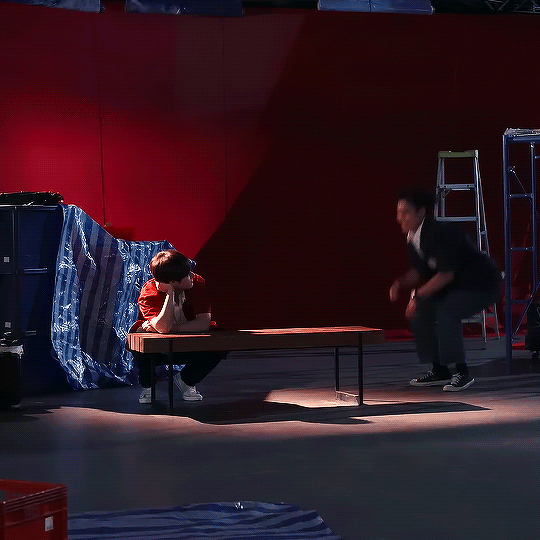
Anyways, this was me holding a sermon in the town square, thank you for listening. Come Wednesday, P’Aof and co will come strolling in to the square, drinks in hand, and say “see you looking, catch it, here’s your cola” and dump all their soda all over me. And you know what? I will welcome it.

A small biblio of bad buddy meta and other posts I have been reading and thinking about, and posts I think in some way or another talk about the things I have mentioned here:
Growth and Aging of Queer Relationships by @moonlitfantasyblr and @waitmyturtles
They Love Each Other! by @gracefulnosplinters
Nong Nao Mask by @lurkingshan
A Full Circle by @jemmo
#bad buddy the series#bad buddy#a tale of a thousand stars#BBS#ATOTS#OS2 x BBS x ATOTS#our skyy 2#our skyy 2 x bad buddy#our skyy 2 x a tale of thousand stars#pat jindapat#pran parakul#pat x pran#phuphatian#tian sopasitsakun#phupha viriyanon#bad buddy meta#bad buddy brain rot#the brain rot is terminal#there is no other show#bl drama#i love p'aof and his mind#i really do#this took me ages to post because i spent way too long trying to find posts to link and kept getting distracted by other meta#apologies my friends#hope this makes sense to everyone i cannot proofread this pls
73 notes
·
View notes
Text
OS2xBBS: My Overall Thoughts
This is severely overdue, but I wanted to distance myself from these episodes to make sure that 1) regency bias didn’t seep through and 2) my thoughts don’t get clouded by the cute, swoony moments (all the kissing!) in an attempt to mask deeper plot and characterization issues, and 3) with some difficulty, I try to set aside how desperately I wanted OhmNanon’s reunion with PatPran to live up to the OG series.
So, to address the last item, for the most part OhmNanon’s chemistry was still alive and well, save for a few hiccups. This is a testament to two very experienced professionals. That said, my biggest gripe with these special episodes was the treatment of the Pat and Pran characters that has nothing to do with the actors.
It didn’t feel like a true crossover of two beloved series but instead felt like Pat and Pran’s presence were more like afterthoughts thrown into an ATOTS script. Pat and Pran were merely there to serve Phupha and Tian’s story and that is were I take great issue. In this case, Ohm and Nanon should not have been billed as main leads but rather supporting characters that have extended guest arcs in an ATOTS sequel.
Maybe setting plays a larger role here. I’ve asked myself if I would feel this way if Phupha and Tian got thrown into Pat and Pran’s university life instead. But I can’t imagine a storyline where the inverse of what we got makes sense since PatPran are the more established couple and PhuTian have no reason to leave PPD.
My wish was that instead of a crossover, P’Aof would have let BBS stand on its own even if it meant we got two fewer episodes out of it. While we did get glimpses of Pat and Pran’s life three-years into their relationship, it felt watered down because they weren’t in their own environment but a borrowed one. So, really, more like seeing them while on vacation than anything truly concrete. A lot of ‘what have Pat and Pran been up to and where are they in their relationship’ was left to viewer interpretation, which is all fine and well if what P’Aof had to say about the state of their relationship made any sense.
Fake fighting and cute hijinks aside (Ohm and Nanon can sell these type of scenes in their sleep); what I’m after is the meatier stuff like the end of EP4, the entirety of EP5, EP10, EP11 and EP12. Where is the Pran that got choked up when Pat revealed he ran after him with his guitar; who gripped his hand when Pat volunteered to fake break up to win back Pran’s friends and wordlessly said I’m here to stay. Where is the “but I care about you more” Pran?
And where is the Pat who communicated so openly with his man? Who served as a walking advertisement of what it means to be a soaring green flag to all those who came before and after him? Why was he reduced to an amalgamation of Harry and Lloyd from Dumb and Dumber? Make it make sense, P’Aof. Pat never, ever, not once, came off as a dumb himbo in the OG series, so why was he reduced to that here?
The script could have been so much better, tighter, just more substantial. And we can't even say that P'Aof didn't have the space to include a meaningful story for them; I call bullshit on this notion. There's so much story that you can tell in a single hour. We've seen him do it with the BBS pilot.
It felt like so very little thought went into the BBS side of the story. Does P’Aof not know how to write established relationships in a compelling way? I know this can't be true because he gave us EP12, but why did it feel like he phoned it in with these bonus episodes? It’s like P’Aof knew he had both boys for a limited time and just threw the entire kitchen sink at them and anything that stuck made it into the final cut. Like, he relied heavily on the actors to bring it home for him. And that really wasn't fair to Ohm or Nanon who really did the best they could with what they were given.
I mean, even if he wanted to show the (realistic) cracks in their relationship, there were so many better ways to show this than have Pran essentially running away, avoiding Pat (basically regressing to who he was pre-relationship) and then treating Pat like a bumbling Barney Fife for following him? There was no fire in either of them to fight for or with one another. They were shown to have grown complacent (and dare I say taking each other for granted?) which is so at odds with what we got in the OG series that I was confused at what I was watching onscreen. It did not feel like a continuation of EP11 leading to EP12, in fact it felt very disconnected from their origin story.
Pat Jindapat. What they did to my guy was a travesty. They took away all his depth and cast him in the role of a bumbling idiot. Don't get me wrong, OG Pat had his comedic moments but I felt like OS2 veered so far into the extreme of 'lets bring the funny' that it fell completely flat. It was NOT funny. It was disappointing and sad to see one of my favorite characters reduced to this cartoon version.
More than senselessly reducing Pat to cannon fodder to merely serve as comic relief, I'm upset that Pran's growth from the series was essentially negated to where he became, in some ways, unrecognizable. More than once, it felt like Pran was just tolerating Pat's presence rather than basking or gravitating towards it. Again, so inconsistent for a guy who longed for his man for literal YEARS.
Gone are the days of "I'm done adapting" or adoringly staring at the space Pat used to occupy with heart eyes. I just don't get how we went from that Pran to this Pran to the Pran who readily committed his life to Pat in EP12. This in-between Pran is a stranger to me.
Final words: I'm both grateful that we got extra scenes with our boys but at the same time wish P'Aof had left them untainted.
#bad buddy#patpran#bad buddy series#i miss my boys#ohmnanon#pat x pran#bbs#late to the party as always#can't even claim to be fashionably late as this is 10 months after the fact#but I'm here and ready for discourse
17 notes
·
View notes
Note
Heyo! I have a friend I'm trying to get more into BL. She's watched KinnPorsche and I recently got her to watch 3 Will Be Free (I know, not BL). She's somewhat picky about the romance she likes to consume, so I thought I'd ask you which BLs you think would be best to get her started with the genre. Her specifications are 1) a good, solid plot (any type is fine); 2) slow burn; 3) and good chemistry. She also loves sci fi and fantasy. My initial thoughts are MoD, Not Me, and AToTS. Any additions?
BLs with: 1 Good Story, 2 Slow Burn, 3 Good Chemistry, 4 PNR elements if possible
I have not one specific list for you, but several! Many of these not updated so likely to recommend pre the 2023 madness. (Imma rag on some of your choices briefly: KP & MoD only satisfy one criteria - chemistry IMHO.
I did give you a final list of winners at the bottom tho!
1) BLs with the best stories:
2) BLs with best slow burn:
3) BLs with the best chemistry:
(by my definition)
4) PNR BLs (paranormal, sci-fi, or fantastical elements)
P'ABL did the math:
BLs that do or should show up on most of those lists:
Dear Doctor I’m Coming for Soul (Thailand) - the first one I thought of that satisfies all criteria. Good story, great chemistry, PNR & slow burn. By your friend's accounting, this should be the perfect BL. I'm a fan of this show and I have a full review here BUT I don't actually rec it often. Why? My quibble with DDICFS is that for dyed-in-the-wool BL or romance fans the ending may not satisfy, BUT that seems to be the one thing your friend is NOT - so this should be perfect.
Triage (Thailand) - good chemistry, frustratingly slow burn, def PNR, and good story. This was my second pull. It suffered at the time of airing from distribution issues and (perhaps more sadly) being up against KP. It's really good tho. A “correct the past” Groundhog Day plot, that has narrative baggage I normally do not like but is so clever about time loops, I have to forgive it my hang-ups. About a doctor who must save a boy to fix reality, but not in the usual way.
Until We Meet Again (Thailand) - GREAT story, decent chemistry, very PNR, but not slow burn. It’s a perfectly executed fated mates reincarnation plot, fantastic well-seeded twists & reveals, and the only BL I would love to see adapted by other countries or read professionally translated.
Old Fashion Cupcake (Japan) - slow burn, great story & chemistry, no PNR. This is a deceptively simple office romance that actually has a lot to say about life, love, maturity, and pancakes. It’s charming but also deeply moving and loving in its exploration of what it means to give up, and how connection can bring with it second chances. It’s also beautifully filmed and acted.
Seven Days (Japan) - slow burn, great romance plot, good chemistry, no PNR. This is a pitch perfect elegant little YA romance that stays completely true to its yaoi roots but neatly avoids all the flaws of the genre. The story is deceptively simple but allows for angst and miscommunication to develop with VERY good reason, and is almost worth studying because of that. As a romance, it is elegant. I can see why it got stolen adapted.
1000 Stars (Thailand) - solid romance, very slow burn, okay chemistry, no PNR. All BL is romantic, but not all BL is a modern romance in the literary sense of the term, but 1k* is just that, an absolutely glorious slow burn gay romance that nods at BL but isn’t behooven to it. It’s just a really well executed linear romance story.
HIStory 3: Trapped (Taiwan 2019 Viki) - not PNR and maybe not exactly slow burn but aces everything else. (This was MY KP when it aired.) Taiwan often struggles with story because their BLs aren’t always long enough to really get stuck in, Trapped is different. It has a baby murder investigation that promotes conflict between the leads, so the romantic tension is between plot and character, it’s so smart. The leads did a GREAT job of showcasing mature chemistry. The side dishes in this series are wonderful too. The main couple has an amorphous ending, but like with Dear Doctor, that shouldn't rank under these specific circumstances.
My School President (Thai 2023 YouTube) - great chemistry, very slow burn, okay story, no PNR BUT you have to like YA. I know not everyone does. This is very youthful. GMMTV gave us a classic high school set Thai BL with tropes like messy boys singing their feelings that made this one Love Sick for the modern age with all the gentle sweetness and pining ache, but none of the dated damaging tropes or issues. Yes, we’ve seen it all before, but I still ADORE this. And there is a lot to be said for the classics being executed perfectly. Who let my BL be this wholesome and funny? Possibly too slow burn for some, we wait many eps for that pay out, and Tin's pining is NOT quiet, but it defines dorky and earnest, so when the payout comes? Lovely.
About Youth (Taiwan 2022 Gaga) - exactly the same criteria as MSP just Taiwan's version. A truly lovely little coming of age high school BL with a classic YA low drama but high angst and an earnest depth. I didn’t even mind the singing, and that’s saying a lot. A weak seme/uke dynamic but tons of BL tropes (both rare in a high school setting but common for Taiwan) makes this one feel both sweet and colored by an almost real world queer authenticity and grit. Full review here.
See You After Quarantine? (Taiwan 2021 Viki) - it's short there isn't a ton of story development, but it's a nice nugget introduction to Taiwan's style. Great chemistry, def slow burn, and CUTE. This under-appreciated gem is Taiwan’s answer to Gameboys and is just as charming and adorable yet still quintessentially Taiwanese. It features a Japanese love interest and the cutest most confused disaster gay. Slow burn because the two have almost no actual screen time together and yet manage some truly amazing chemistry. How does Taiwan do it?
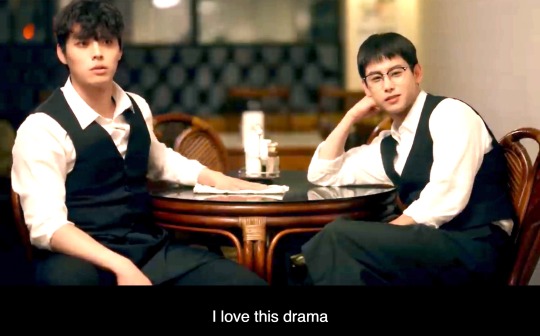
Why no KBL?
Fascinating but despite the fact that KBL tends to earn the highest ratings from me and occupies the most slots in my 10/10 BLs of all time, because they are so short they tend to fall... erm... short in the arena of story and slow burn. Also, until recently, not a lot of great chemistry.
So here are a few others I considered but ended up eliminating for not containing enough of your required elements:
He's Coming to Me (Thailand) - review here
Nobleman Ryu’s Wedding (Korea) - this has a 12th Night meet Cinderfella feel to it, plus some great story tricks like a plot that requires a historical setting (I love it when narrative elements are codependent).
Our Dining Table - It’s a quiet & cozy little parable of found family alleviating loneliness. Possibly too slow for some but definitely high up there for me with the best of what Japan can do, it’s only flaw (if I dare say such a thing) is that it is not really “romantic.” Lovely & sweet but the romance beats are being used to build a family relationship, not just couple intimacy, it’s OK with me, but not totally BL.
DNA Says Love You (Taiwan) - full review here
Ghost Host Ghost House - if your friend likes horror and culture immersion this might be a winner. Boys shack up with ghosts and each other. The story is weak but everything else is on point and it has some of the best slow burn HOT chemistry ever to hit our screens. No... really. The THIRST is real.
Semantic Error (2022 Viki) - Simple story, no PNR, not slow burn, but for Korea it’s some of the best chemistry the traditional studios have ever managed. It is flawless BL. Truly, perfection for the genre. If your friend doesn't like this, BL is probubly not the right genre. Full review.
Light on Me - def slow burn but story is a little weak and while there is chemistry, it's not really acted upon. Also v YA and a little stiff. I love this BL unreasonably.
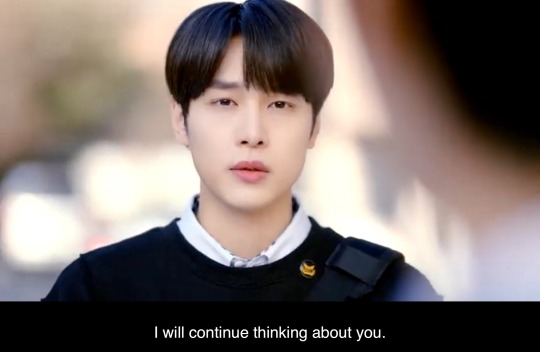
KP not tagged to protect me from the fandom. Don't troll me and prove my point. Remember I can has ban hammer and am not afraid to use it.
(source)
#asked and answered#BLS with good plot#BLS with great story#slow burn BLs#BLs with good chemistry#thai bl#taiwanese bl#japanese bl#live action yaoi#Dear Doctor I’m Coming for Soul#Triage#why does no one ever think of Triage?#Until We Meet Again#of course#Old Fashion Cupcake#best BL boy#Seven Days#never forget my ability to rec that show is ever present#1000 Stars#atos#HIStory 3: Trapped#My School President#About Youth#See You After Quarantine?
71 notes
·
View notes